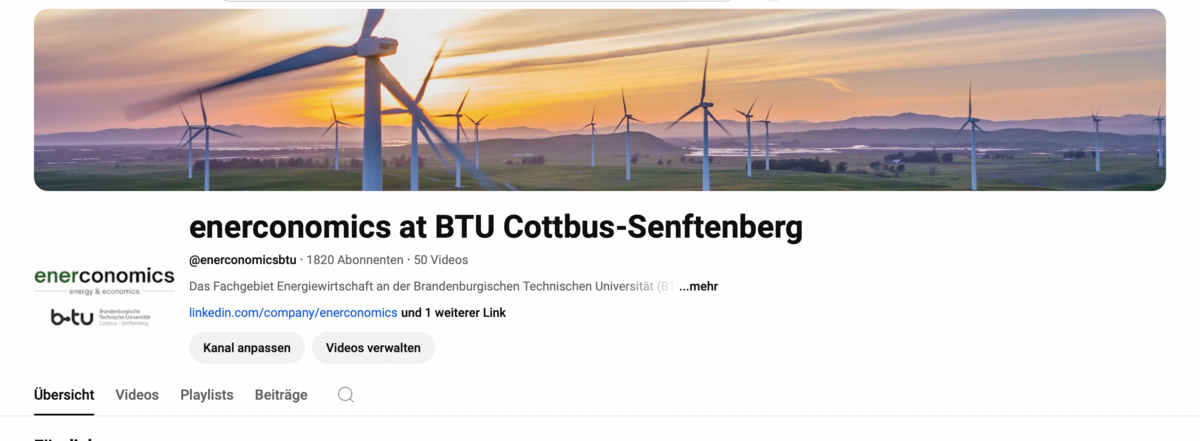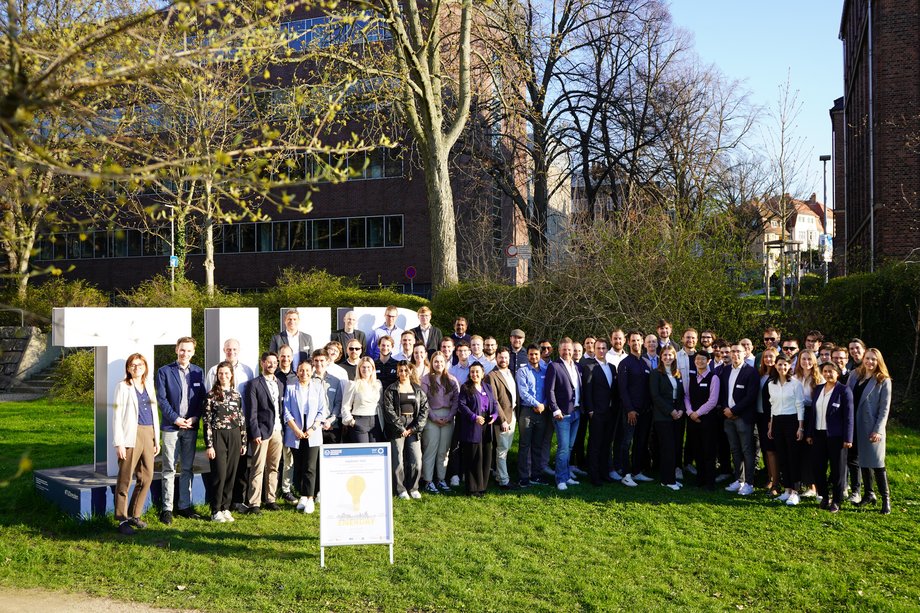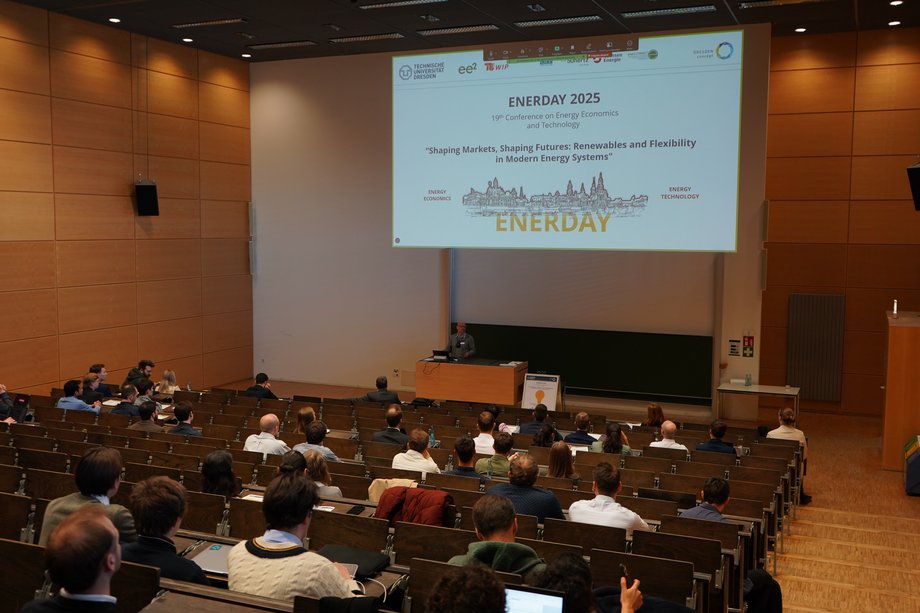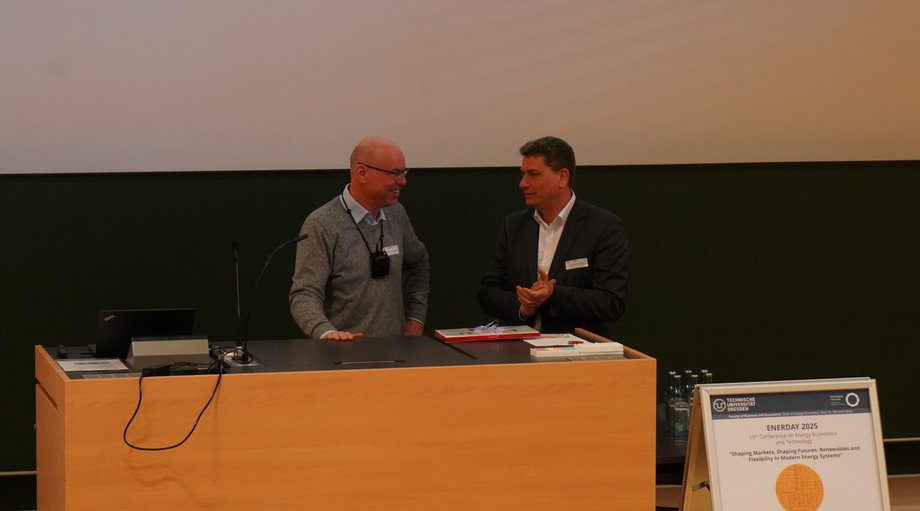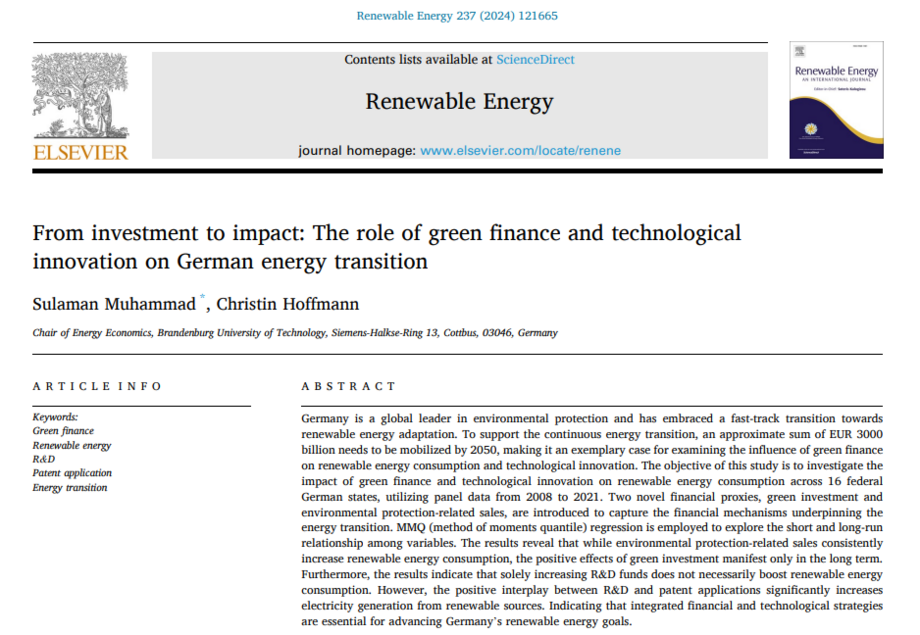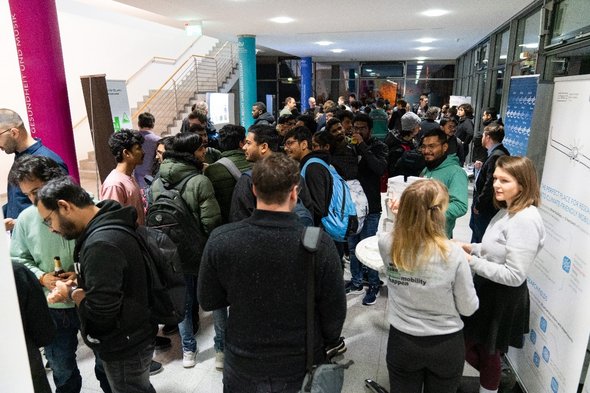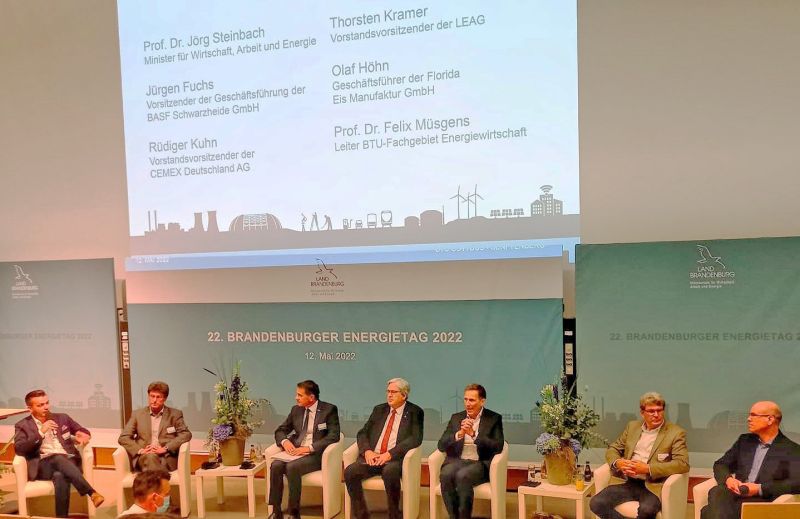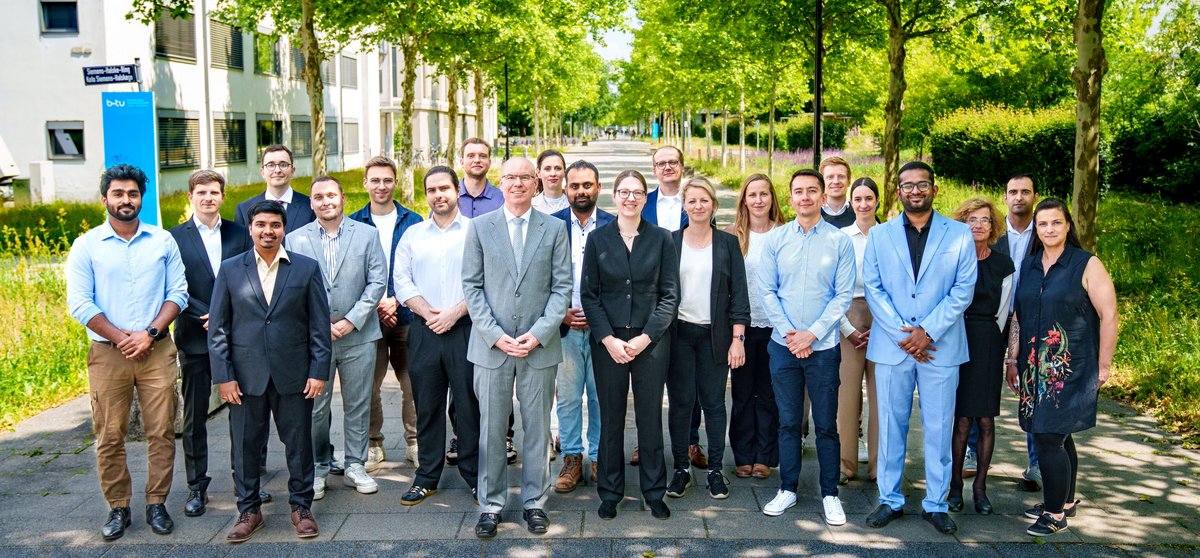
New study in Applied Energy Hourly CO₂ assessment of electricity consumption now possible more precisely and quickly
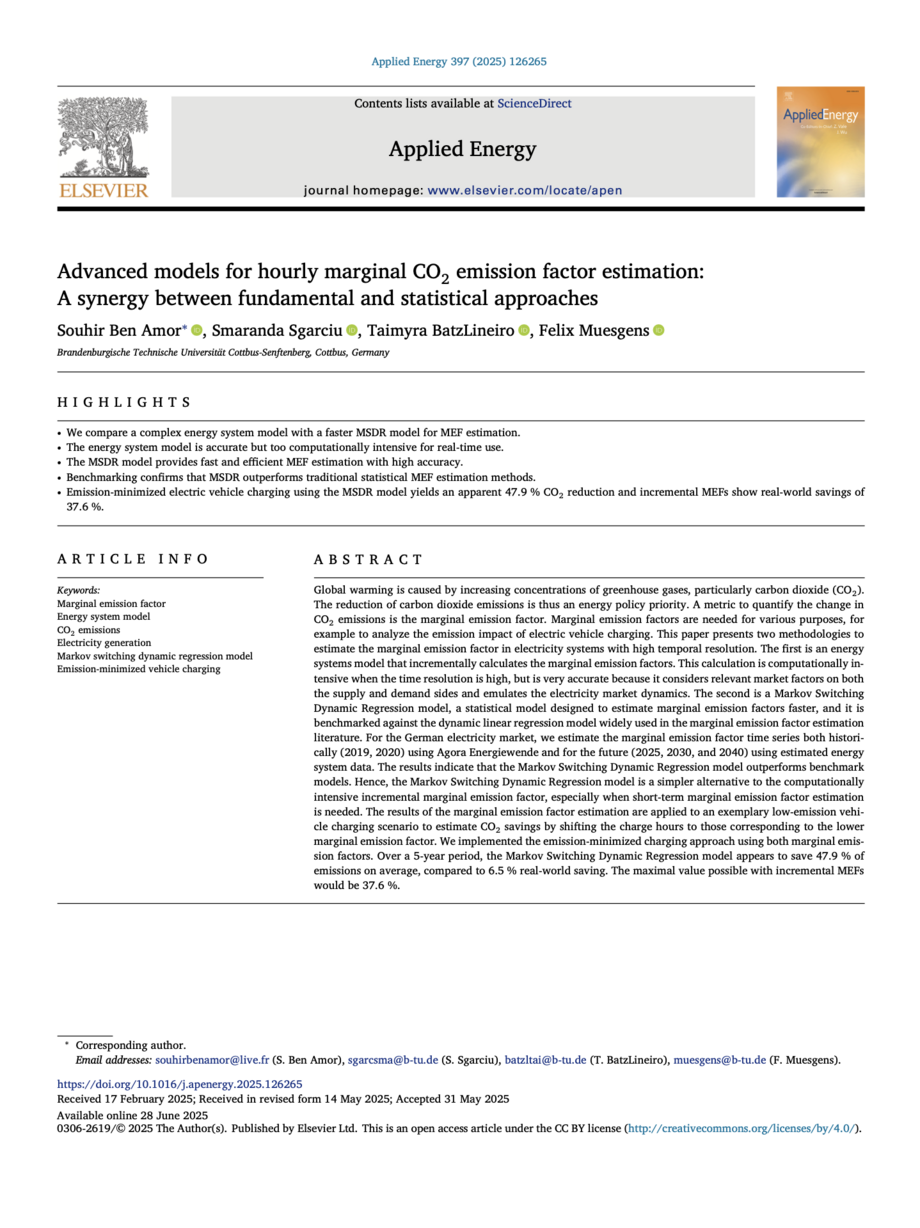
The current publication entitled "Advanced models for hourly marginal CO₂ emission factor estimation: A synergy between fundamental and statistical approaches" was published in the high-ranking journal Applied Energy and sets new standards in the field of Energy Economics. The authors Dr Souhir Ben Amor, Smaranda Sgarciu, Taimyra BatzLineiro and Prof. Felix Müsgens investigate how hourly resolved CO₂ emission factors can be calculated efficiently and reliably - an important basis for climate-friendly decisions in electricity consumption.
What's new?
The study compares a detailed but computationally intensive energy model (ESM) with a statistical model based on Markov Switching Dynamic Regression (MSDR). The aim: to calculate the hourly CO₂ emissions caused by electricity consumption precisely and efficiently - for current and future electricity systems.
Why is this important?
In contrast to average values (AEF), which are suitable for political comparisons, MEFs provide CO₂ information at a precise point in time. This is crucial for:
- Emission-optimised charging of electric vehicles,
- smart load shifting,
- climate-conscious industrial and household decisions.
Key findings:
- MSDR is fast and surprisingly accurate: in simulations, up to 47.9% CO₂ could be saved if the charging of e-cars was optimised according to the MEF.
- The model is openly accessible and can be transferred to other energy markets.
- The study provides hourly-resolved MEFs up to 2040 for Germany - a first.
Conclusion:
This study combines scientific depth with practical relevance. It shows how energy modelling and statistical methods can work together to make electricity consumption even more climate-friendly in the future.
Link to the study: https: //doi.org/10.1016/j.apenergy.2025.126265
Open source on GitHub: Modelling-Hourly-Marginal-CO2-Factors
Prof. Felix Müsgens in a radio interview on the role of battery storage in the energy transition
Prof. Felix Müsgens from BTU Cottbus-Senftenberg was interviewed several times as an expert on the current development of the energy transition in a recent radio programme on RadioEins (RBB). Among other things, the programme focused on the expansion of battery storage systems, their significance for the power grid and the challenges associated with the planned construction of new gas-fired power plants.
Prof. Müsgens explains that the prices for battery storage systems have fallen significantly in recent years - by around half. This has led to a sharp increase in grid connection requests: "Really in the gigawatt range, so more than 200 gigawatts. That's a huge amount. The peak load in Germany is 85 gigawatts."
According to Müsgens, battery storage systems are a "wonderful addition" in the short term, in particular to photovoltaics. They could help to shift solar power to the evening or early morning hours, i.e. when consumption is still high but there is no more sunlight. However, for longer periods without sun and wind - so-called dark doldrums - their benefits are limited: "If we have stored electricity for two hours, this is of little help if we have little renewable feed-in for a fortnight."
Prof. Müsgens was also critical of the planned construction of new gas-fired power plants. In his view, the time frame is problematic: even with rapid planning and realisation, commissioning is not expected before 2032. At the same time, according to international experts, the electricity system must be climate-neutral by 2035. "A gas-fired power plant that goes online in 2032 would therefore either have to be taken off the grid or converted to hydrogen just three years later. This shows how difficult the situation has become."
The RBB report emphasises how topical the energy policy debate is and shows how complex the challenges on the path to climate neutrality are - especially in the electricity sector.
New publication on the acceptance of bioenergy in Germany
We are pleased to announce the recent publication of our colleagues Dr Christin Hoffmann, Shanmukha Srinivas Byrukuri Gangadhar and Prof. Dr Felix Müsgens in the renowned journal Energy Economics.
The article entitled "Smells like Green Energy: The Impact of Bioenergy Production on Residential Property Values in Germany" analyses whether the commissioning of bioenergy plants has a negative impact on house prices in the immediate vicinity. The authors assume that a fall in prices can be interpreted as a negative sign for the acceptance of bioenergy.
The results show: Even if on average there is very little to no loss in value, there are negative effects on house prices of around -1.3% in the vicinity of particularly odour-intensive biogas plants and in the direction of the wind.
The research provides valuable impetus for a socially acceptable energy transition and shows that successful projects must focus on acceptance as well as technology and economic viability.
With an impact factor of 13.6,Energy Economics is one of the leading international journals in the field of Energy Economics. The publication there demonstrates the high scientific quality and relevance of the article.
We would like to congratulate our team on this excellent publication!
If you activate the integrated Youtube videos, you consent to the transfer of personal data to the provider and to the use of cookies to save the setting. Information of the BTU on data protection
Successful defence of Dr Thomas Möbius' dissertation
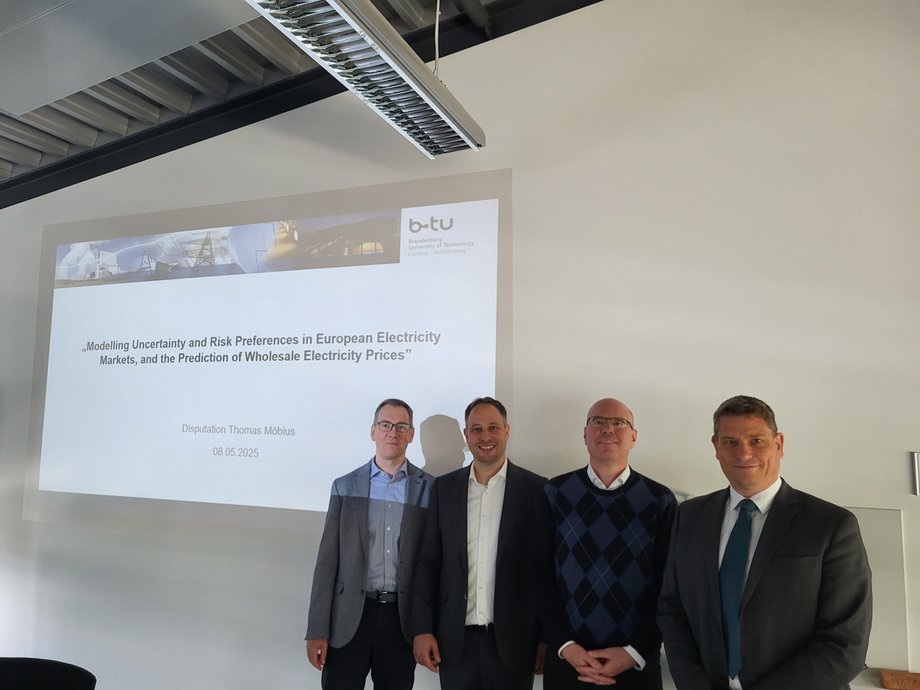
The chair would like to congratulate Dr Thomas Möbius on the successful defence of his dissertation entitled "Modelling Uncertainty and Risk Preferences in European Electricity Markets, and the Prediction of Wholesale Electricity Prices".
In his thesis, he presented five published studies dealing with the modelling of uncertainty and risk preferences in European electricity markets and the prediction of wholesale electricity prices.
During the disputation, there was a lively discussion about the value of techno-economic energy system modelling (ESM) in price forecasting. There was agreement that ESMs are superior to statistical models in the long term, but remain inferior in the short term (e.g. day-ahead). However, Thomas Möbius' work shows impressively that the integration of ESM results can improve the validity of statistical models - and thus also enable valuable forecasts in the short term.
Special thanks go to Wolfram Berger for his professional and collegial supervision of the examination and to Prof. Dominik Möst, who acted as second supervisor and undertook the second written assessment.
Congratulations to Dr Thomas Möbius and good luck with your future scientific projects!
Publications in the context of the dissertation:
Riepin, T. Möbius, F. Müsgens (2021), Modelling uncertainty in coupled electricity and gas systems-Is it worth the effort? Applied Energy, Vol. 285, 116363. DOI | Code
T. Möbius, I. Riepin, F. Müsgens , H. van der Weijde (2023), Risk aversion in flexible electricity markets, Energy Economics, Vol. 126, 106767. DOI | Code
T. Möbius, M. Watermeyer, O. Grothe, F. Müsgens (2023), Enhancing Energy System Models Using Better Load Forecasts, Energy Syst. DOI | Code
M. Watermeyer, T. Möbius, O. Grothe, F. Müsgens (in review), A hybrid model for day-ahead electricity price forecasting: Combining fundamental and stochastic modelling, Working Paper | Code
S. Ben Amor, T. Möbius, F. Müsgens (in review), Bridging fundamental model with the econometric approach for electricity price forecasting. DOI
New study: The value of information in electrical distribution grids
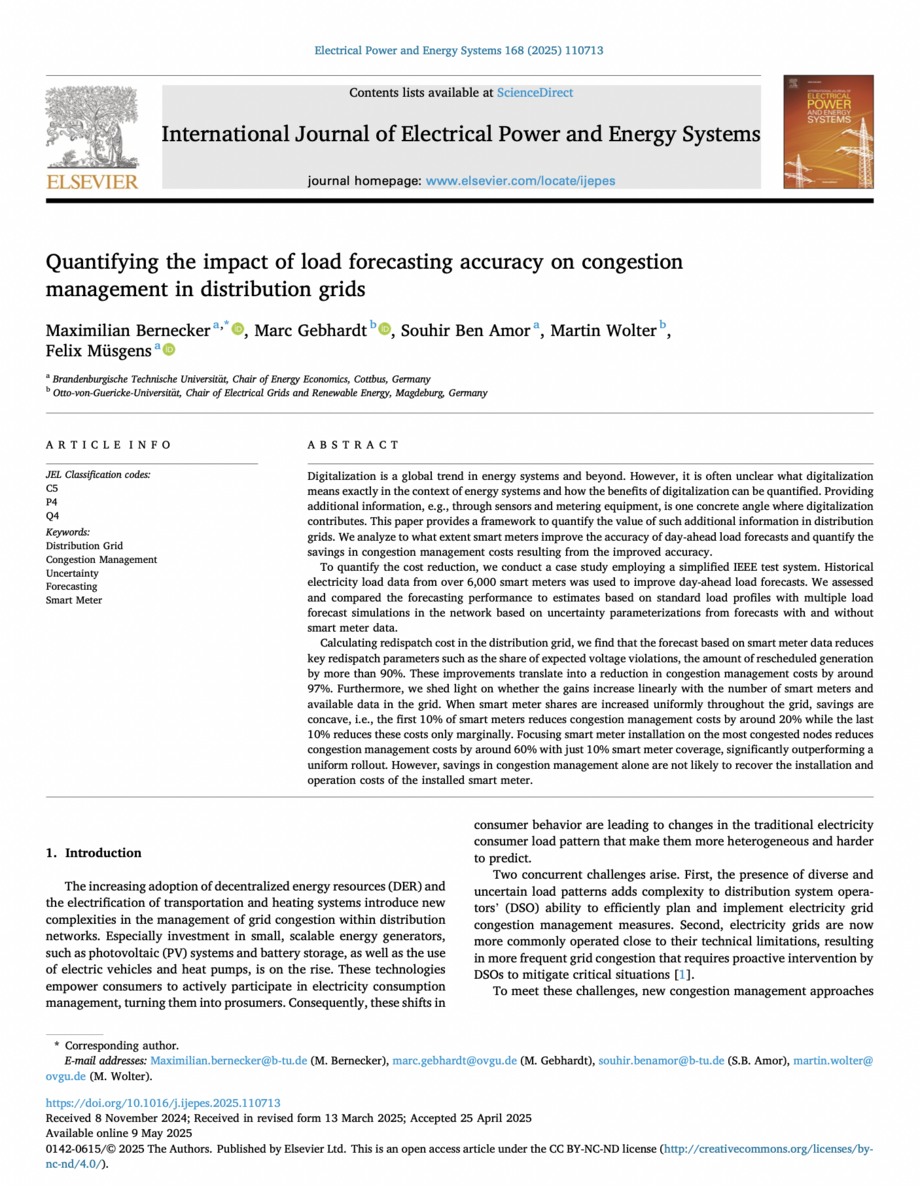
In the current study "Quantifying the impact of load forecasting accuracy on congestion management in distribution grids", which was published in the renowned International Journal of Electrical Power & Energy Systems, the researchers quantified the economic value of information in electrical distribution grids. The focus was on analysing how data from smart meters can help improve day-ahead load forecasts and thus reduce the costs of congestion management in distribution grids.
The results of the study, which was written by Maximilian Bernecker, Marc Gebhardt, Souhir Ben Amor, Martin Wolter and Felix Müsgens, make it clear that the economic efficiency of a meter rollout can be increased if the critical nodes in the distribution grid are covered first. The study recommends prioritising the critical nodes in the distribution grid in order to enable a more targeted use of the data obtained and to achieve a more effective reduction in the load on the electricity grid.
The analysis makes it clear that although the savings from improved congestion management are considerable, they are not sufficient to fully compensate for the installation costs of smart meters. It therefore emphasises that further economic measures are necessary to ensure the profitability of a nationwide rollout.
You can find the full study here: To the article
For further information or queries, please do not hesitate to contact us.
New publication on energy security and electricity prices in the EU
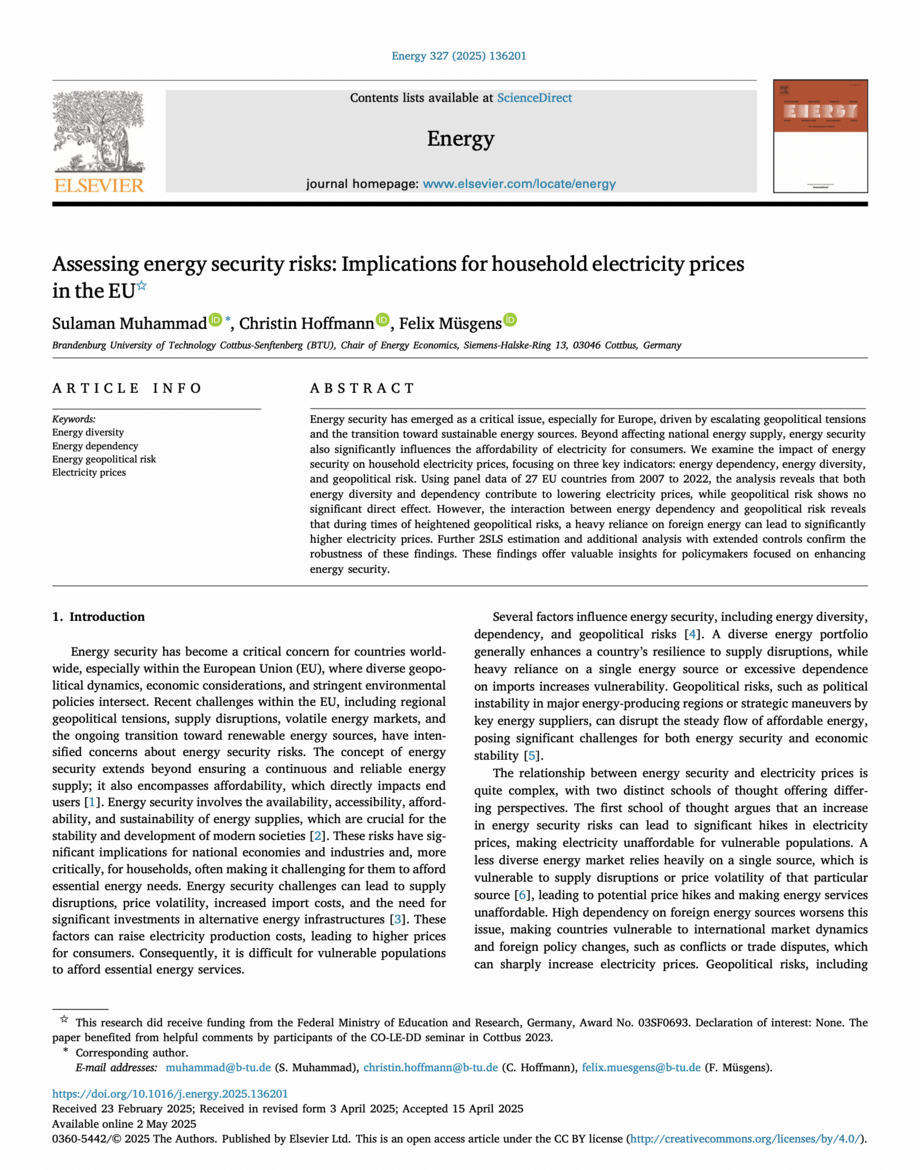
We are pleased to present the latest publication by our colleagues Dr Sulaman Muhammad, Dr Christin Hoffmann and Prof. Dr Felix Muesgens in the leading journal Energy.
The article entitled "Assessing Energy Security Risks: Implications for Household Electricity Prices in the EU" analyses how different dimensions of energy security influence the affordability of electricity for households in Europe. The study analyses three core indicators - energy dependence, energy diversity and geopolitical risk - using panel data from 27 EU countries for the period 2007-2022.
The results show that lower energy diversity and higher levels of dependency are associated with lower electricity prices, challenging conventional assumptions. Interestingly, geopolitical risk alone does not show a significant direct impact, but its interaction with energy dependency underlines an important finding: in times of geopolitical instability, high dependency on foreign energy drives electricity prices significantly higher.
This research offers valuable insights into the complex trade-offs between energy security and affordability and emphasises the need for nuanced policy approaches that ensure both resilience and consumer protection.
Further information can be found here: https: //doi.org/10.1016/j.energy.2025.136201
Workshop review: Energy system models for a more efficient energy transition

As part of the annual meeting of the Energy System Analysis 2025 research network, we successfully organised our workshop "Energy system models - how can they help to make the energy transition more efficient?".
Led by Prof. Dr Felix Müsgens (BTU Cottbus-Senftenberg) and Prof. Dr Dominik Möst (TU Dresden), the participants discussed more efficient approaches to climate neutrality in the energy system in small groups. The workshop was divided into three central phases:
1. defining downstream goals: at the beginning, environmental goals and security of supply were analysed in order to identify inefficient measures.
2. small group work: the participants developed concepts to increase efficiency and discussed possible solutions, e.g. to reduce system costs and speed up grid expansion.
3. quantification approaches through modelling: Finally, the results were compiled and evaluated with regard to their feasibility and modelling potential.
Special thanks go to all participants for the committed discussions and to the organisation team for the excellent planning and implementation.
New study on the future of energy markets with 100% renewables and electricity storage
In a recent article in the renowned journal Energy Economics, Prof. Dr Felix Müsgens (BTU Cottbus-Senftenberg) and Prof. Dr Werner Antweiler (University of British Columbia) investigate whether an energy market based solely on fluctuating renewable energy sources and electricity storage can continue to function efficiently in the future.
Under the title "The new merit order: The viability of energy-only electricity markets with only intermittent renewable energy sources and grid-scale storage", the authors analyse theoretically and empirically how pricing, investment incentives and security of supply behave in such a market design.
The key finding: even in a fully decarbonised energy market with zero marginal costs, stable price levels and investment signals can emerge through competition and free market entry - provided that storage technologies and load shifting are properly integrated into the system. Surplus electricity (curtailment) is not only unavoidable, but also essential for market stability.
The study thus provides important insights for current discussions on market design, storage promotion and security of supply in a world without fossil-fuelled power plants.
Prof. Müsgens gives keynote speech at Enerday 2025 in Dresden
Enerday 2025 - one of the leading scientific conferences on Energy Economics in the German-speaking world - took place at the University of Technology Dresden on 4 April 2025. With around 80 participants, the event was very well attended. It impressed with its professional organisation, pleasant atmosphere and many exciting contributions from research and practice.
Our Head of Department, Prof. Dr Felix Müsgens, opened the event with a keynote speech on the topic of "Renewables and Flexibility in Modern Energy Systems". In his presentation, Prof. Müsgens presented key findings from current research on the role of renewable energies and storage in future electricity markets. Among other things, he analysed whether and under what conditions energy-only markets can also prove viable in a system with almost exclusively renewable energy sources and large-scale storage operations.
The presentation offered exciting insights into theoretical models, empirical analyses (e.g. on Texas and Germany) and new perspectives on future market design in the context of the energy transition. Particular emphasis was placed on the so-called "new merit order" and the economic mechanisms that determine pricing processes in a system based entirely on renewable energies.
We would like to thank the organisers at TU Dresden and Prof. Dr. Dominik Möst for a successful conference and are pleased about the lively scientific exchange with colleagues from Germany and abroad.
You can find the keynote presentation here.
Visit by Member of the Bundestag Maja Wallstein to the chair Last Thursday, we welcomed Mrs Maja Wallstein, Member of the Bundestag from Cottbus, to our chair of Energy Economics and the EECON Lab.
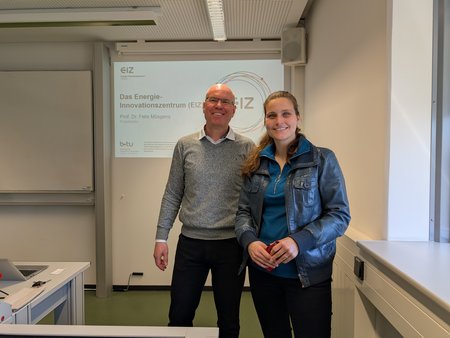
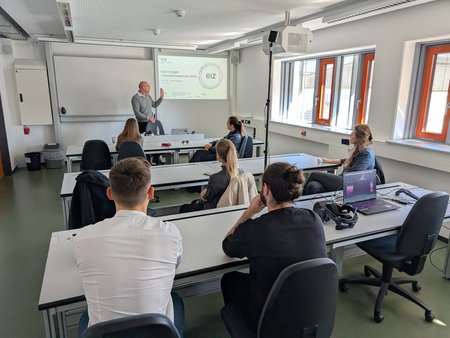

The meeting kicked off with an informal exchange during which Ms Wallstein and her team as well as the EECON employees present introduced themselves to each other. Prof. Dr Felix Müsgens then presented the vision of the Energy Innovation Centre (EIZ) as well as the goals and future aspirations of the EECON Lab. Innovative research approaches for transforming the energy system are a particular focus here.
One of the highlights of the visit was the presentation of a current research project that deals with the topics of acceptance and citizen participation in the energy transition. Virtual reality technology is being used to bring scenarios to life in order to actively involve citizens in planning processes. Mrs Wallstein took the opportunity to put on VR glasses herself and was impressed by the immersive presentation and the potential of this technology.
We would like to thank Mrs Wallstein for her interested visit and the open exchange. We look forward to seeing her again soon and wish her every success in the coming legislative period!
New study examines generational differences in moral behaviour after reunification How does a political system change shape moral behaviour across generations?
This fascinating question is the focus of a recent article by Dr Christin Hoffmann, together with Thorsten Auer and Timo Berg, published in the European Journal of Comparative Economics. The article is entitled "Inter- and intragenerational differences in corrupt behaviour: the development of morals after German reunification" and is based on an Onilne experiment with 168 participants. The study investigated whether the influence of the different political systems in divided Germany 1. led to differences in moral behaviour, in particular corrupt behaviour, and 2. whether the differences revealed are also evident in subsequent generations who grew up in the same political systems after reunification.
The results show: Younger Germans show an overall higher willingness to bribe than older Germans. It is noteworthy that young East Germans even show a slightly higher propensity to bribe than their peers in the West - an indication of profound institutional and cultural influences that have had an impact for decades.
The publication by Dr Hoffmann and her co-authors provides important insights into the connection between transformation processes, generational change and the moral economy.
A contribution worth reading for anyone interested in behavioural economics, political economy and transformation research.
Research by Prof. Müsgens taken up in pv magazine
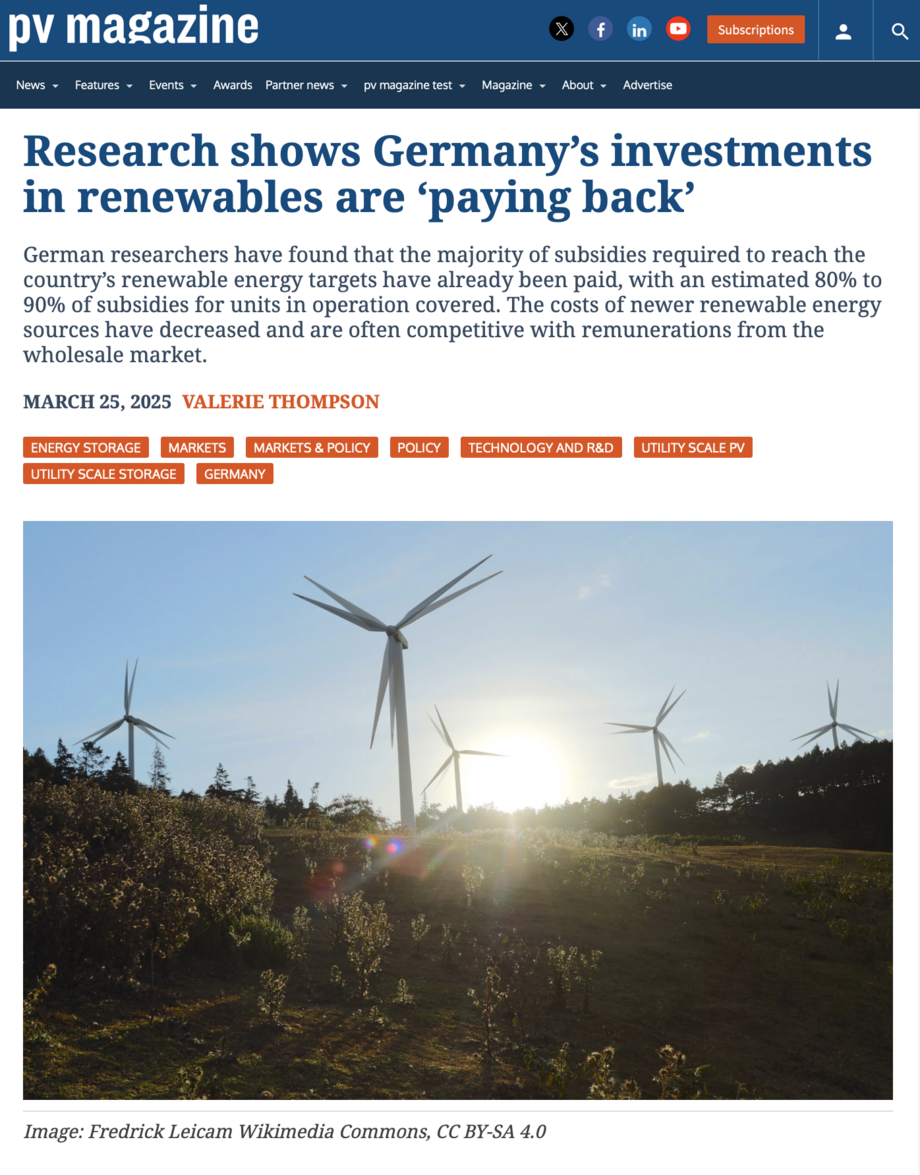
A recent scientific article by Prof. Dr Felix Müsgens has been picked up by the international trade press. The study, published in the specialist journal Energy Policy, analyses the financial impact of the Renewable Energy Sources Act (EEG) in Germany.
The results show that around 80 to 90 per cent of the subsidies required for existing annexes are already covered by feed-in tariffs and falling technology prices. In addition, the costs for new wind power and photovoltaic systems have fallen considerably in recent years. These developments are helping to make renewable energies increasingly competitive with wholesale electricity.
The renowned pv magazine picks up on the study and emphasises how investments in renewable energies are already having a positive impact today. The publication underlines the relevance of sound economic analyses for the energy transition and shows the contribution that our chair's research can make to the evaluation of energy policy measures.
You can find the article under this link.
Pay-back Time: Renewable Energy Sources on the Rise!
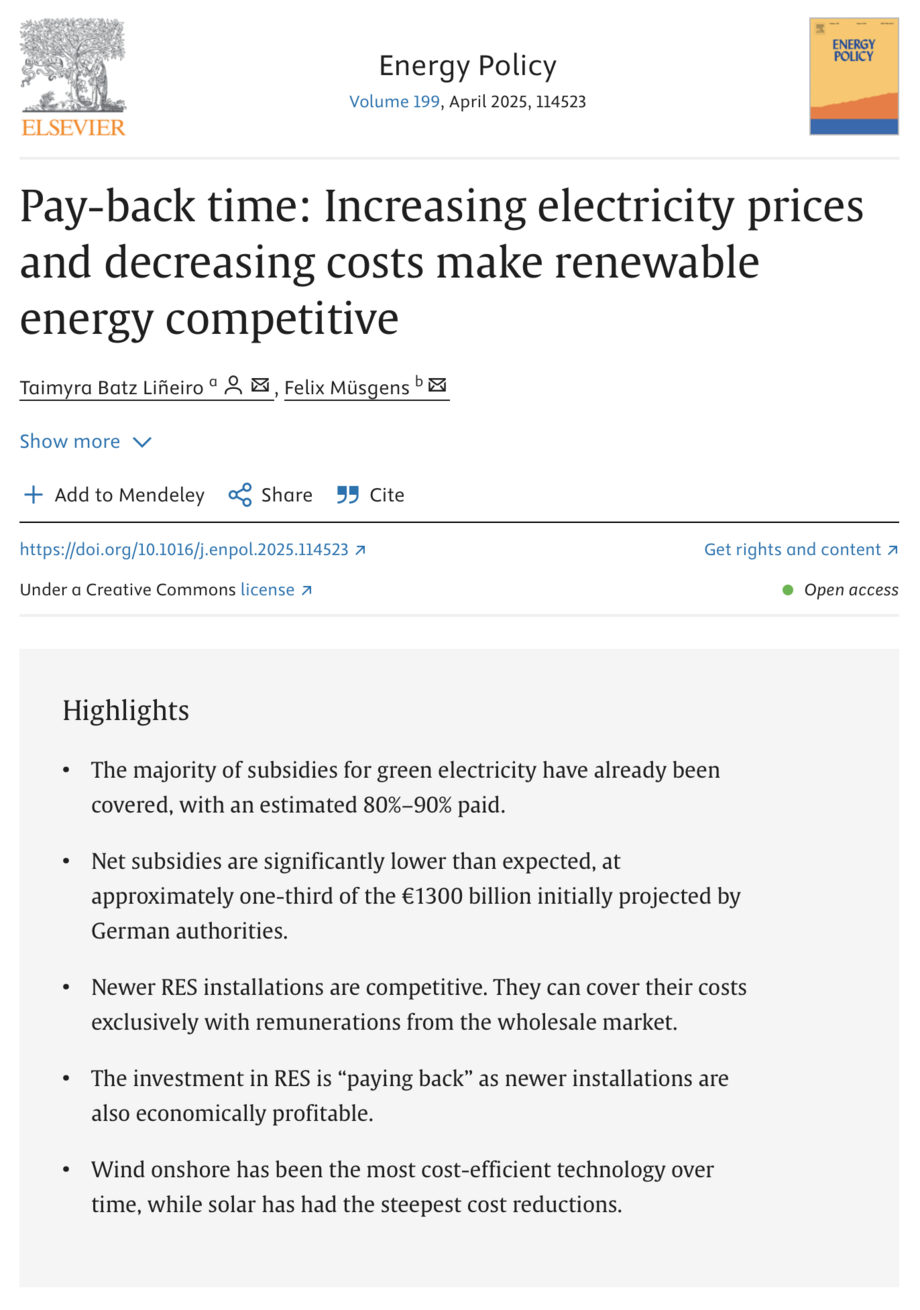
New scientific article out: "Pay-back time: Increasing electricity prices and decreasing costs make renewable energy competitive" by Taimyra Batz Liñeiro and Felix Müsgens from @Brandenburg University of Technology Cottbus-Senftenberg. The article was published in Energy Policy (impact factor of 9.3 in 2024).
Key Insights:
- Renewable energy sources (RES), such as wind and solar, are much more economically viable due to decreasing generation costs and rising electricity prices.
- In Germany, a global leader in RES, net subsidies will decline in the future. New installations of wind onshore, wind offshore, and ground-mounted solar systems are close to profitability without financial support.
- Over all installations in Germany, wind onshore stands out as the most cost-efficient RES technology, while solar power has evolved from one of the costliest to one of the most affordable options.
Impact & Significance:
- The study quantifies Germany's renewable subsidies from 2000 to 2041, including all units built until the end of 2021. It reveals that the majority of net subsidies has already been covered. Future net subsidies will account for only 7% to 17% of the total expenses.
- With current and projected electricity prices, newer RES units are expected to "pay back" to society while contributing to a cleaner energy system at the same time.
- These findings highlight that concerns over excessive subsidies are often unfounded, paving the way for accelerated renewable adoption without excessive public spending.
As we move towards a sustainable future, this research demonstrates that renewables are not only environmentally essential but also financially competitive. Let's keep driving the energy transition forward!
Read the full article here: https://www.sciencedirect.com/science/article/pii/S0301421525000308#abs0015
Prof. Felix Müsgens interviewed by Tagesschau24 "KlimaZeit: Climate policy in the election campaign" In this interview, the energy expert explains the challenges of the dark doldrums and possible solutions for a stable and affordable electricity supply.
If you activate the integrated Youtube videos, you consent to the transfer of personal data to the provider and to the use of cookies to save the setting. Information of the BTU on data protection
According to Müsgens, a dark doldrums - i.e. a phase with little wind and solar power - leads to extremely high electricity prices that can be up to 20 times higher than average. However, these price peaks are necessary in order to finance investments in power plants, as these are very expensive.
Müsgens names three options for reducing electricity prices:
1.State subsidiesThe price of electricity could be reduced through tax revenue. However, this is an illusion, as the costs would merely be redistributed from the electricity bill to the tax burden.
2. reprioritisation in the energy policy target triangle: An earlier shutdown of coal-fired power plants could be desirable in terms of climate policy, but would drive up costs further.
3. increasing economic efficiency: Müsgens believes this is the best solution. The aim would be to ensure the most efficient power supply possible with the available resources in order to reduce costs.
When asked why reserve power plants are not used in the event of a blackout, Müsgens explains that they are only intended for absolute emergencies such as a blackout. In addition, high electricity prices are necessary to secure investments in power plants. If reserve power plants were to step in too early, operators would no longer be able to cover their costs, which could lead to a shortage of power plants in the long term.
Müsgens emphasises that a clear decision must be made about the future energy system. There is a choice between market-based coordination, in which competition regulates the electricity market, and state regulation, in which the state specifies in detail how the energy supply is organised.
There is currently an unclear mixture of both systems, which is inefficient and makes investment more difficult. Müsgens recommends introducing targeted reforms without fundamentally destabilising the system.
The full interview, from minute 21:09, can be found here: https: //www.ardmediathek.de/video/klimazeit/klimazeit-klimapolitik-im-wahlkampf/tagesschau24/Y3JpZDovL3RhZ2Vzc2NoYXUuZGUvNzExYjQ1NmEtOGE5OC00OWY3LWE5YjMtYzYwY2M4ODZhMjUx
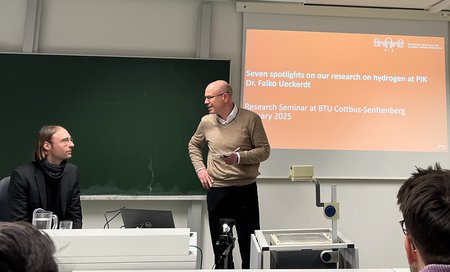
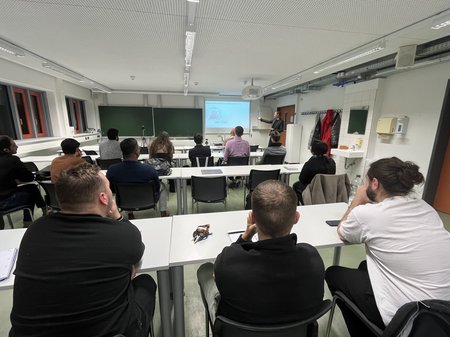
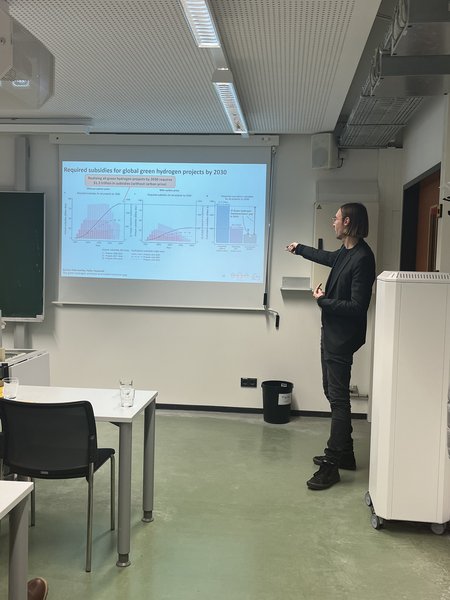
Research seminar with Dr Falko Ueckerdt from PIK
On the evening of 21 January 2025, we welcomed Dr Falko Ueckerdt, team leader of the PIK - Potsdam Institute for Climate Impact Research, to our chair. As part of our research seminar, he presented his team's research on hydrogen, electrification and the transformation of industry.
In an extremely vivid presentation, he began by describing the function of the newly founded Energy Transition Lab at PIK, where transformation pathways to sustainable climate-neutral energy supply and demand systems are being investigated. In the main part of his presentation, he introduced several research topics that are at the centre of their investigation. Among other things, he highlighted aspects of necessary CO2 prices, the role and risks of CCU and options for sectors that are difficult to electrify. Finally, he presented a recently published article on the global expansion of hydrogen. He showed that the gap in ambition and realisation of green hydrogen is slowly closing until 2030.
We would like to thank Dr Falko Ueckerdt for his contribution and wish him and his team continued success in advancing the science of energy transformation. We hope to continue our dialogue in the future.
Prof. Müsgens in the Tagesspiegel on the future of the energy transition
A recent article in the Tagesspiegel newspaper addresses the growing challenges of the energy transition in Germany, in particular the problem of so-called dark doldrums - phases in which wind and solar power are almost completely unavailable. The report describes how Germany was once again reliant on expensive electricity imports, including nuclear and coal-fired power, in December. Without a rapid expansion of storage technologies, flexible power plants and improved infrastructure, there is a risk of supply bottlenecks in the long term.
As the Tagesspiegel further reports, Prof. Felix Müsgens, Head of the Energy Innovation Centre at BTU Cottbus, emphasises that the combination of solar and wind power with battery storage is a significant step forward. Nevertheless, there is a lack of climate-friendly, secure power in Germany. Müsgens warns that a successful energy transition can only be achieved through political commitment, economic investment and technological innovation.
The article also makes it clear that new market models are needed to boost investment in storage technologies and hydrogen infrastructure. Müsgens considers the idea of permanently low electricity prices to be unrealistic, as high costs are incurred for grid expansion and new power plants. In the long term, however, research and technological developments could lead to more favourable electricity prices.
In conclusion, the Tagesspiegel emphasises that decisive measures, interdisciplinary cooperation and continuous research are essential to secure the energy transition. The window of opportunity for decisive decisions is closing. You can find the complete article here: https: //www.tagesspiegel.de/wissen/was-jetzt-die-energiewende-gefahrdet-das-zeitfenster-schliesst-sich-13011916.html
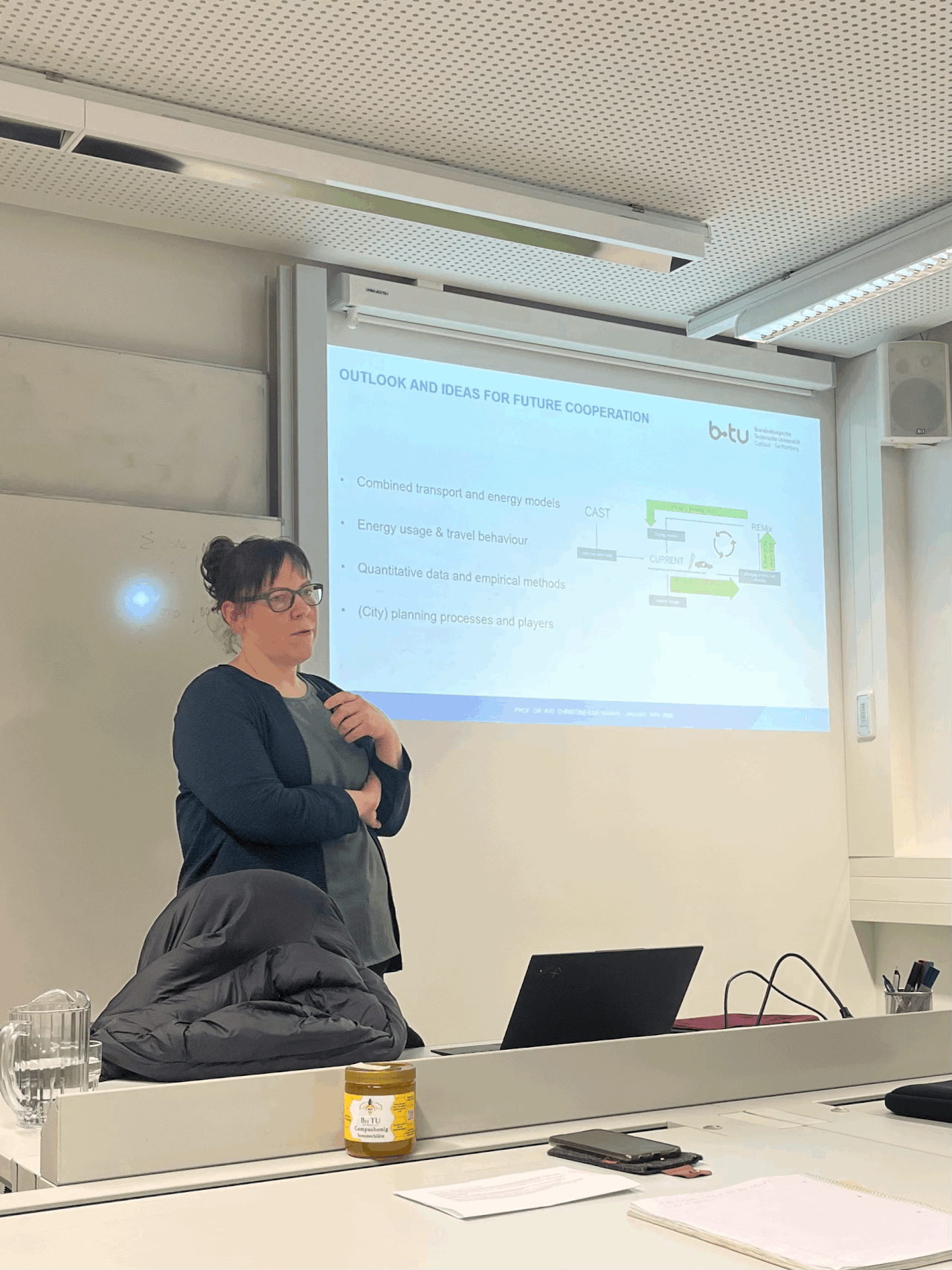
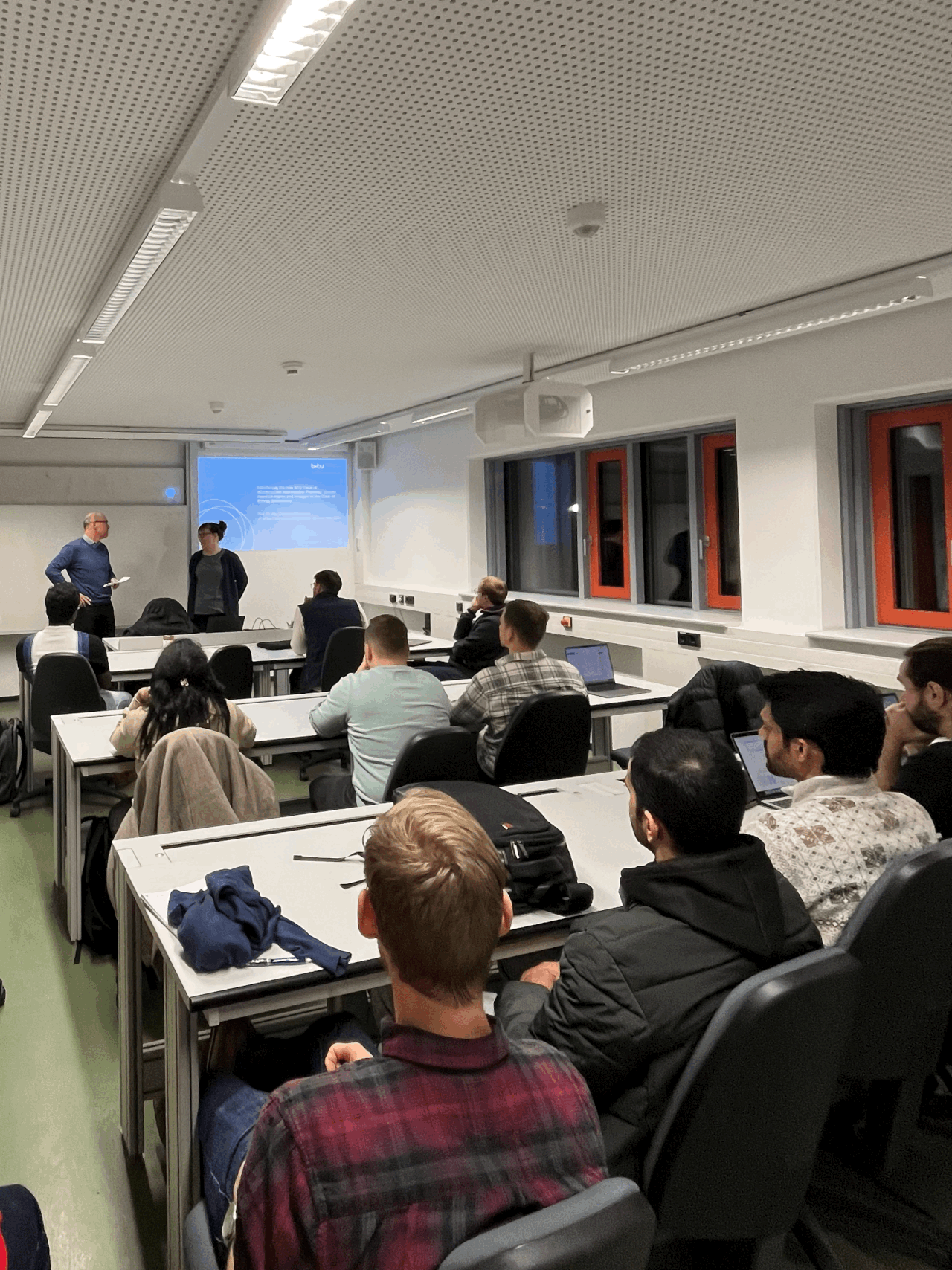
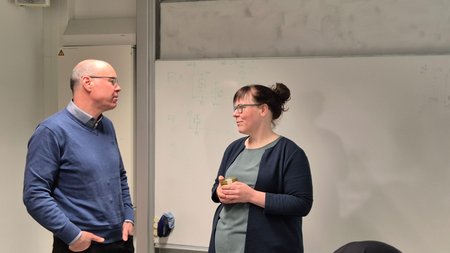
Research seminar on 14.01.2025
In mid-January, another event took place at the Energy Centre as part of the Energy Economics research seminar. This time, we hosted Prof. Dr.-Ing. Christine Eisenmann, Head of the Chair of Infrastructure and Mobility Planning at the Brandenburg University of Technology Cottbus-Senftenberg.
In her lecture, the head of the department presented current and past research projects, such as climate protection in transport and infrastructure planning. She also provided exciting insights into national mobility data in comparison to the regional characteristics of Lusatia.
She also emphasised the importance of the costs of mobility. Finally, she presented urban models, which stimulated discussion among the audience.
We would like to thank Professor Eisenmann very much for her contribution and look forward to continuing the discussion on how our two chairs can cooperate with each other in future projects.
Energy expert Felix Müsgens in an interview with the Märkische Allgemeine Zeitung (MAZ): "We will always face the dilemma: affordable or environmentally friendly."
Prof. Felix Müsgens, head of the Chair of Energy Economics at BTU Cottbus-Senftenberg, discussed the challenges of the energy transition in a recent interview. The conversation touched on issues such as the impact of prolonged periods with low renewable energy generation ("Dunkelflauten"), the importance of grid expansion, and the role of new storage technologies in achieving a stable, climate-neutral, and cost-effective energy supply.
"The transition to a green energy system costs us tens of billions of euros annually. However, technologies like solar power and battery storage offer significant opportunities to make the energy transition more efficient and affordable," Müsgens emphasized.
He criticized the premature shutdown of modern coal power plants and delays in expanding power grids, which have contributed to higher costs today. At the same time, he expressed optimism: "Solar power will continue to become cheaper in the future and can cover a significant portion of energy demand. Battery technology has already advanced to the point where industrial applications are feasible."
Research at the Energy Innovation Center (EIZ) focuses on solutions for a climate-neutral energy supply. Scientists at BTU are developing innovative approaches to improve the usability of renewable energy and ensure energy security.
For more insights and the full interview, which is unfortunately behind a paywall, click here.
New Publication Gives Insights on Germany’s Energy Transition: Exploring the Impact of Green Finance and Technological Innovation
We are delighted to announce the publication of a new research paper titled "From Investment to Impact: The Role of Green Finance and Technological Innovation on German Energy Transition," authored by Sulaman Muhammad and Christin Hoffmann. The paper has been published in the Q1-ranked journal, Renewable Energy, with an impact factor of 9.0.
This study investigates the effects of green finance and technological innovation on the shift toward renewable energy in Germany. Using comprehensive panel data from Germany’s 16 federal states, the authors reveal that innovative green finance elements, specifically green investment and sales related to environmental protection, both positively influence and advance renewable energy adoption. Moreover, the findings suggest that increasing Research and Development (R&D) funding alone may not effectively promote renewables. However, when R&D efforts lead to innovative patent applications, the impact on renewable energy growth is significantly enhanced, underscoring the importance of translating research into tangible innovations.
This research contributes valuable insights to the field of energy transition, offering a deeper understanding of how green finance and technological advancements can effectively support a sustainable energy future in Germany.
Read the full article here: https://www.sciencedirect.com/science/article/pii/S0960148124017336
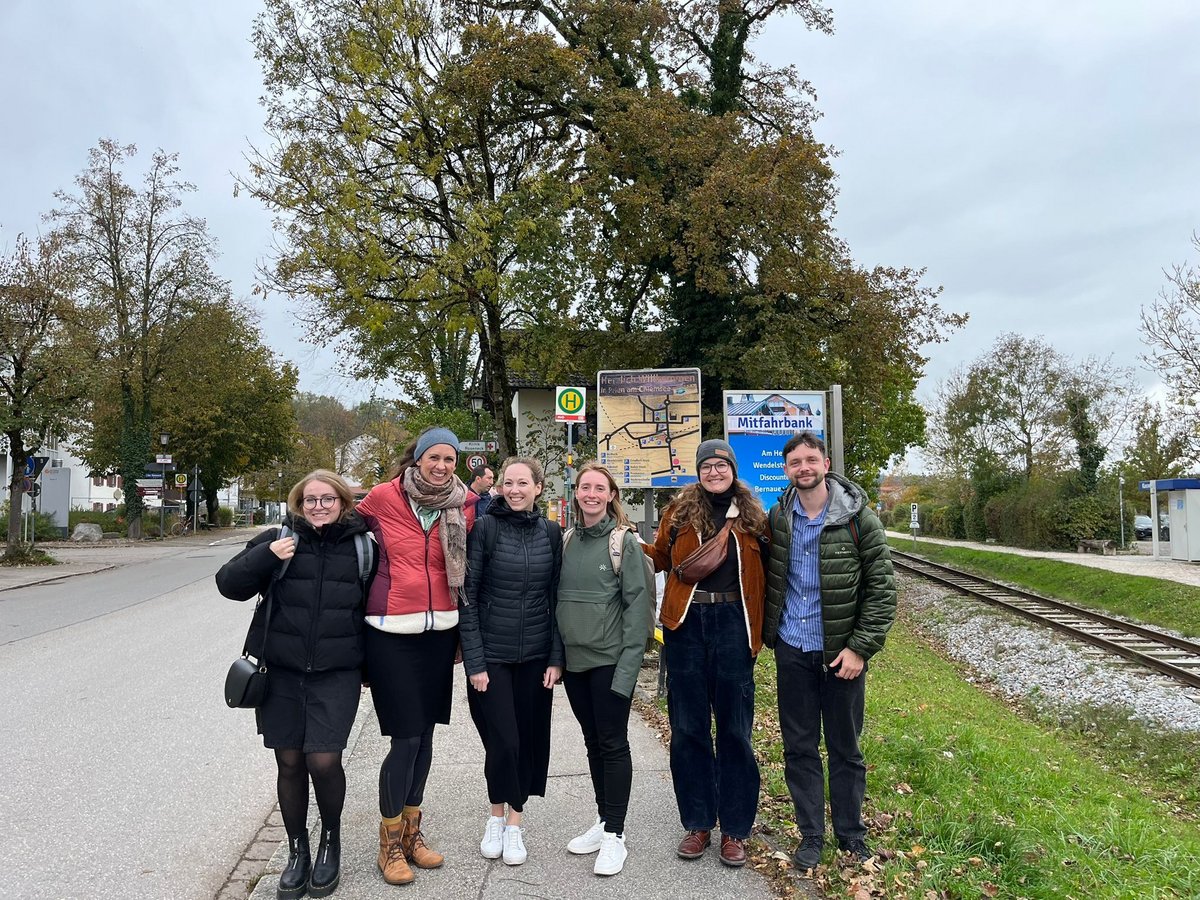

News from the MoVeTo Lausitz Project: Traffic in Senftenberg in Focus!
Consortium Meeting of the mFund Research Project MoVeTo Lausitz
From October 15 to 16, 2024, the MoVeTo Lausitz team met at Fraunhofer IML (Project Center "Transport, Mobility, and Environment") in Prien am Chiemsee to discuss alternative mobility solutions and gain exciting insights into the tourist mobility of the Chiemsee region. Among other things, Dietmar Bauer from Regionalverkehr Oberbayern GmbH presented the on-demand service "Rosi," which we had the opportunity to try out during an excursion. Other highlights included exploring alternative mobility options such as carsharing, ride-sharing benches, and the region's public transportation system. The excursion concluded with a relaxing boat ride on Lake Chiemsee. A big thank you to our hosts from Fraunhofer IML for their excellent organization!
Focus on Traffic Survey in Senftenberg
In parallel, an exciting project is underway in Senftenberg, as recently reported by the Lausitzer Rundschau. Cameras have been installed in the city to analyze traffic on the old B169. Additionally, BTU is currently conducting a mobility survey among Senftenberg's residents. These efforts are part of our research to understand traffic behavior and lay the foundation for a demand-driven transportation system in the Lausitz region. For more details, check out the article in the Lausitzer Rundschau: Traffic in Senftenberg: What’s behind the cameras? Many thanks to Torsten Richter-Zippack from LR for the research and comprehensive coverage.
Visit our website for more information and updates:
MoVeTo Lausitz

Visit of a Delegation from Member of Parliament Andreas Audretsch
On September 16, we had the opportunity to welcome a delegation from the office of Member of Parliament Andreas Audretsch to the laboratory facilities of theEnergy Innovation Center (EIZ). The central theme of the tour was energy transition solutions. Various stations along the route provided the delegation with the opportunity to learn about current projects and developments in the region.
Dr. Niklas Ziemann provided an overview of the research at theEECON | Energy Economics Lab and presented a virtual reality scenario that illustrated the effects of "shadow flicker" and warning lights in connection with wind turbines.
We would like to thank the members of parliament and their staff for the lively exchange and their interest in our research.
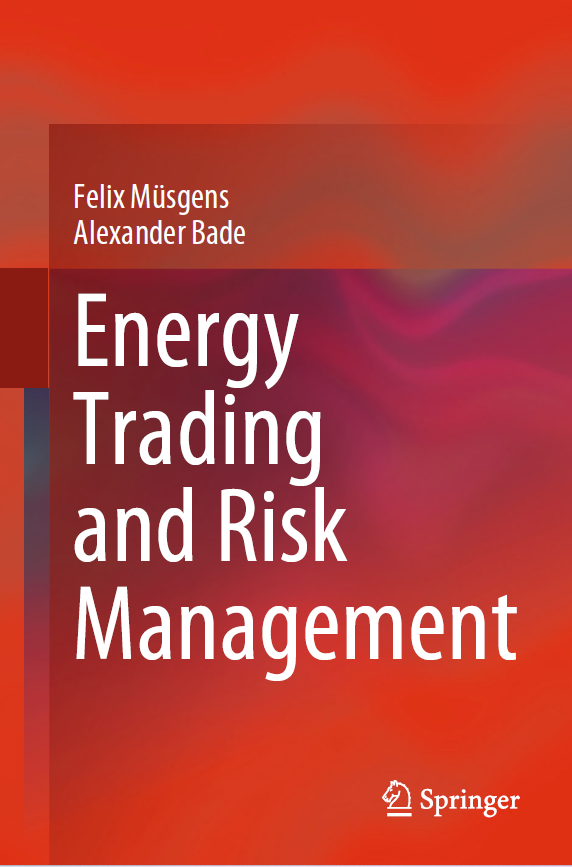
New publication: "Energy Trading and Risk Management" - a pioneering textbook in our chair
The Chair of Energy Economics is pleased to announce the publication of the new textbook "Energy Trading and Risk Management" by Prof. Alexander Bade and Prof. Felix Müsgens with Springer Nature Verlag. This work sheds light on the complex interrelationships and challenges of energy trading and risk management in a constantly changing energy market.
Thanks to the authors' expertise in science and practice, the book offers well-founded insights into the current developments and financial strategies that characterize the energy market. It is aimed both at career changers in energy trading and at students who want to gain an in-depth understanding of the mechanisms and risks involved in energy trading.
Accordingly, special attention is paid to practice-oriented strategies and methods that are indispensable in today's dynamic environment. With a mix of theoretical foundations and practical case studies, the book provides tools for successfully navigating the energy trading industry.
For more information, please see the full text version of the book or visit our website under the ETRM tab.
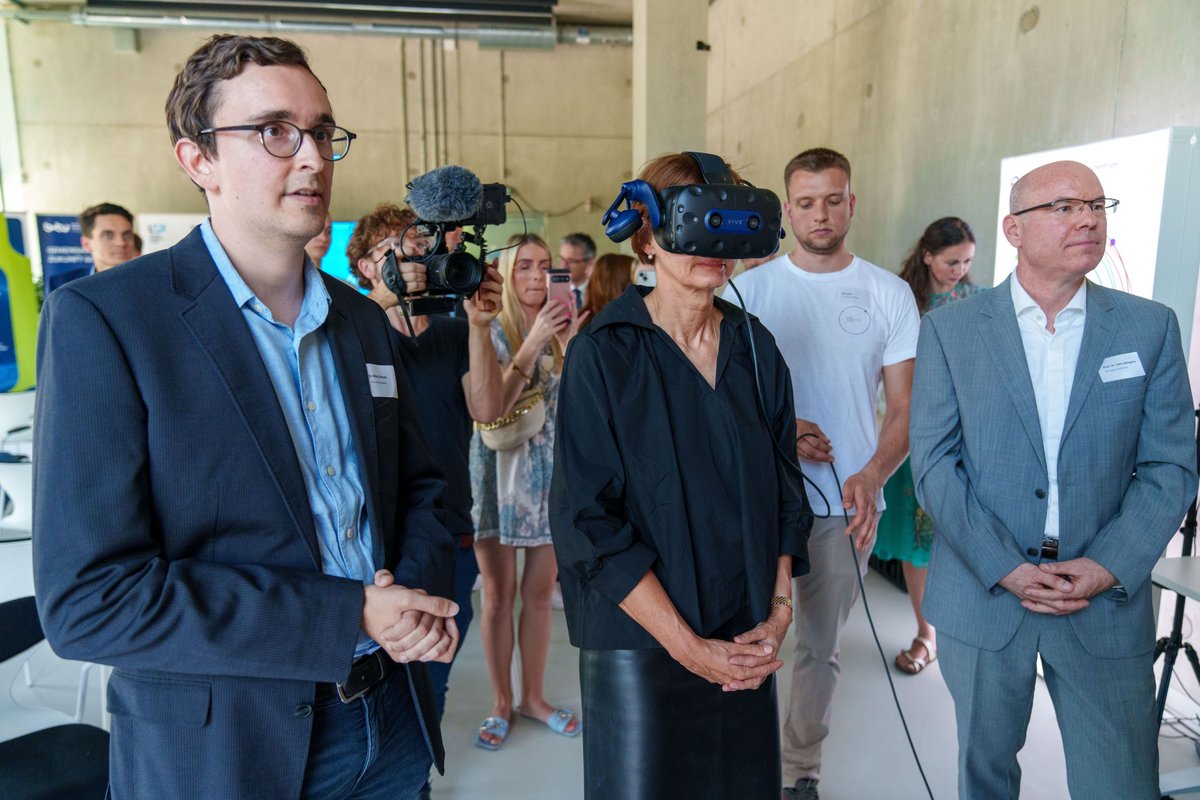

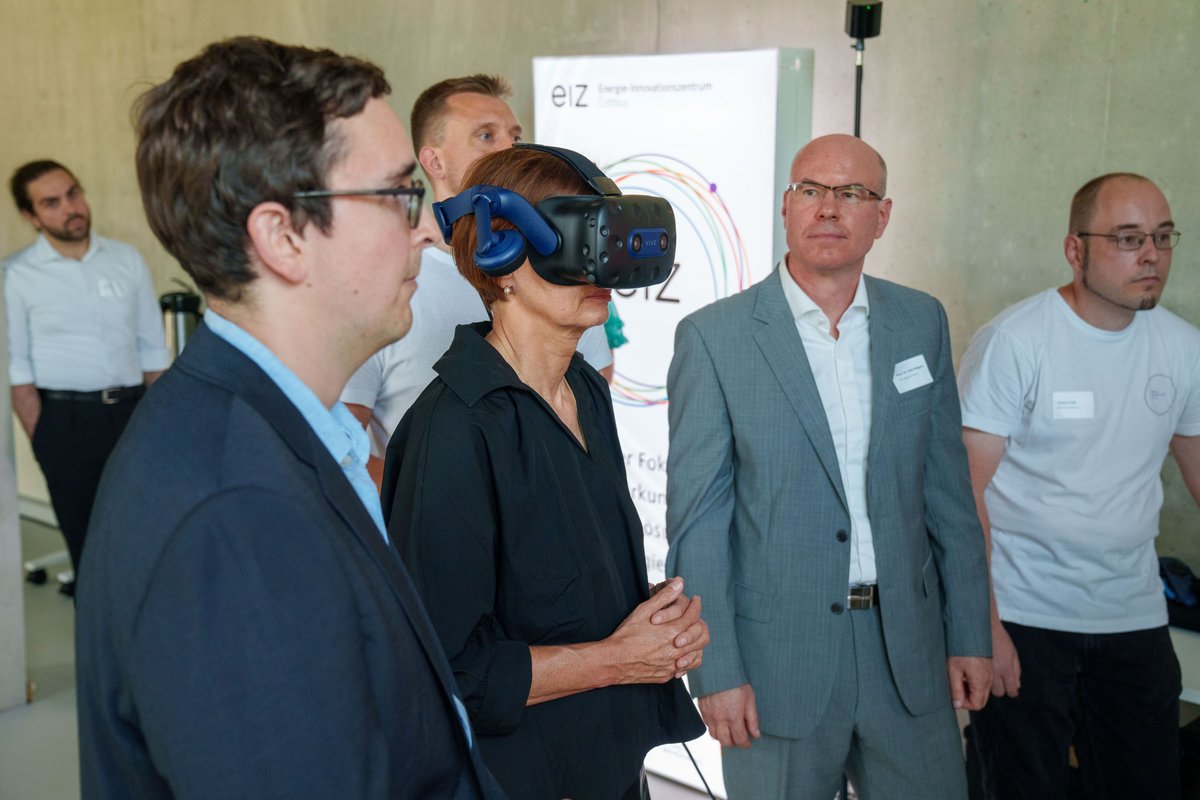
Federal Minister Bettina Stark-Watzinger visits the EIZ
We had the great pleasure of welcoming the Federal Minister of Education and Research, Ms. Bettina Stark-Watzinger, to BTU Cottbus-Senftenberg. Received by the President of BTU, Prof. Dr. Gesine Grande, and the Vice President for Research and Transfer, Prof. Dr.-Ing. Michael Hübner, Ms. Stark-Watzinger was given a comprehensive insight into the diverse activities of the university and its important role in the structural change of Lusatia at the main campus in Cottbus.
As Ms. Stark-Watzinger's ministry provides significant funding for the Energy Innovation Center Cottbus (EIZ) and our efforts to investigate social acceptance and participation in the Energy Economics sector, we are particularly pleased about her visit. Prof. Dr. Johannes Schiffer and Prof. Dr. Felix Müsgens gave a brief overview of the center and its laboratories. Dr. Niklas Ziemann presented two impressive virtual reality (VR) scenarios, which showed the Minister how wind turbines create so-called "shadow casting effects" in nearby single-family homes at sunset. She was also able to find out about the use of green hydrogen in direct reduction plants to reduce CO2 in steel production.
We appreciate the lively exchange with Ms. Stark-Watzinger and her great interest in our research. Special thanks also go to the Brandenburg University of Technology Cottbus-Senftenberg and the Startblock B2 Start-up Center for the smooth organization of this visit.
We look forward to further cooperation and are proud to be able to advance our research and innovations in the context of structural change in Lusatia.
Visit from Federal President Frank-Walter Steinmeier
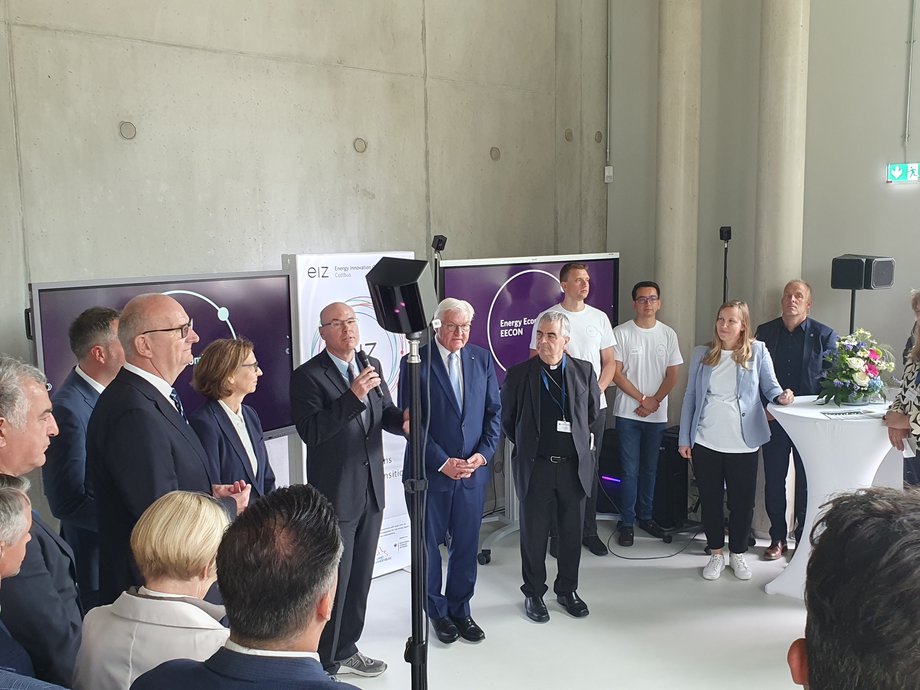
"It was a great honor for us to give the German President Frank-Walter Steinmeier and the Spanish delegation an insight into our research with the help of virtual reality. Our team informed the participants in two VR scenarios about the so-called "shadow flicker" of angular power plants in sunny evening hours and the introduction of direct reduction plants in steel production to reduce CO2 emissions thanks to the reduction of iron ore by green hydrogen. These are two topics that we are investigating in terms of social acceptance and which we quickly got talking to the participants about. We would also like to thank the entire team at BTU and the Startblock B2 start-up center for the great organization and implementation."
New publication on energy-efficient behavior in the workplace published
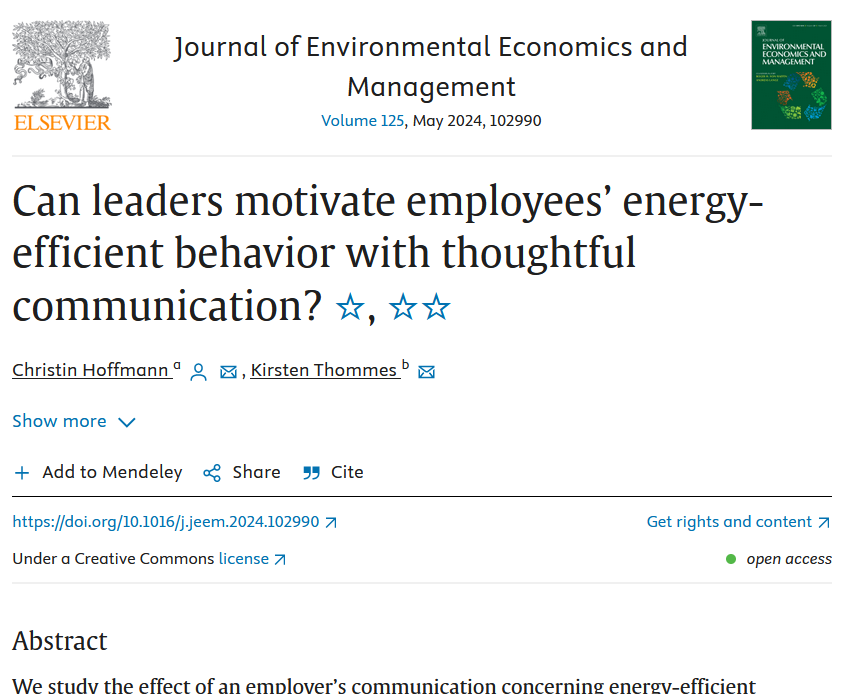
Do messages to employees help and how should they be formulated to fund energy-efficient behavior in the workplace?
Christin Hoffmann and Kirsten Thommes have investigated this and published their findings in their latest publication "Can leaders motivate employees' energy-efficient behavior with thoughtful communication?" in the internationally renowned "Journal of Environmental Economics and Management".
The focus was on the effects of an employer's communication on the energy-efficient behavior of a company's employees. Christin and Kirsten found that messages with this purpose are generally worthwhile. With the help of natural language processing tools, the effects of positive and negative emotions, collective or individual focus and the complexity of the language were also analyzed.
Using a large test group of truck drivers as an example, the authors compared the daily energy efficiency after receiving a message with the daily performance without a previous message. They found that messages generally increased energy-efficient behavior. In addition, messages that conveyed positive emotions and emphasized a collective orientation were more successful. Sending a message showed significant effects on driver performance for up to six days afterwards, leading to economically relevant cost reductions. In our case, messages led to an overall saving of 0.5l of fuel per 100km.
The paper can be found at the following link: https://lnkd.in/er8PDAxh
Review of the EIZ's first annual conference: a year of successful research
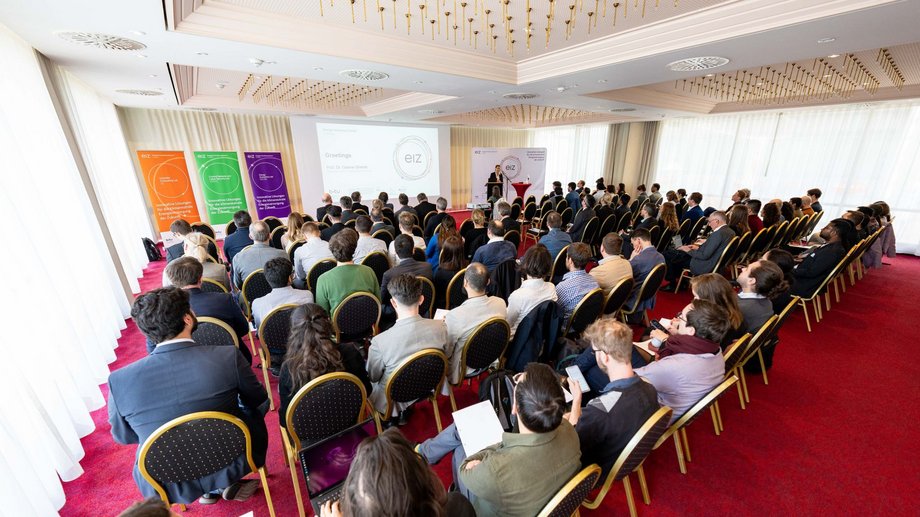
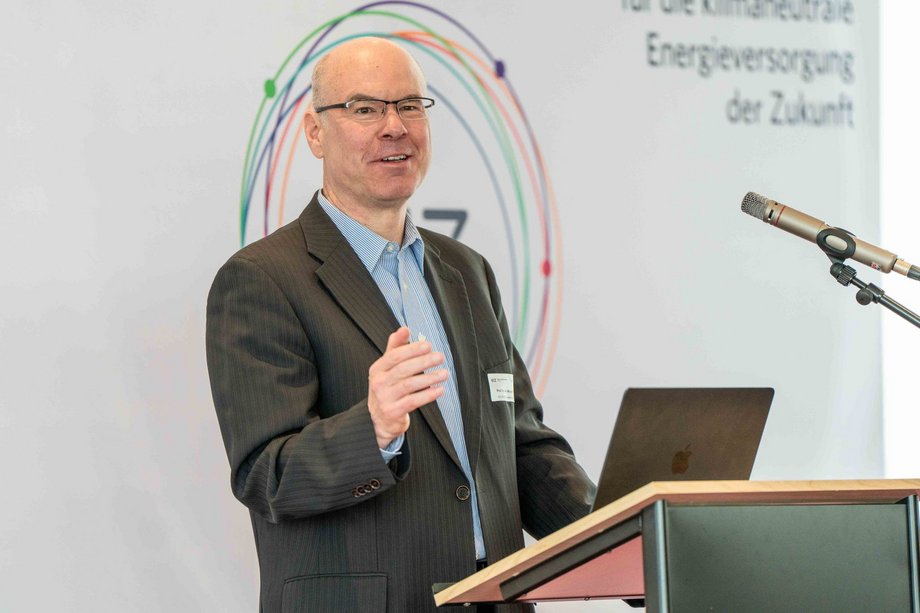
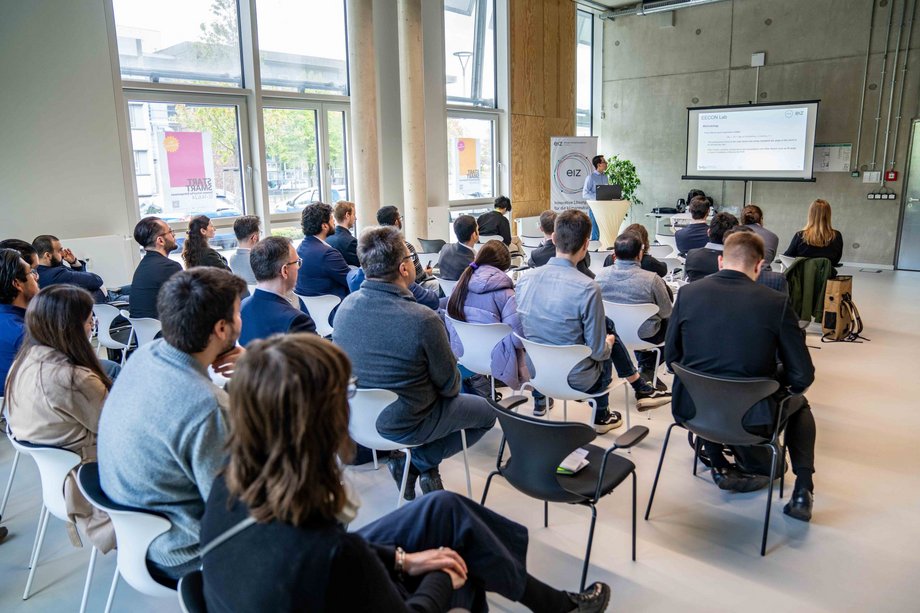
At our first annual conference, technical, economic, political and social issues relating to the energy transition were discussed in depth. The focus was particularly on structural development and the new opportunities offered by renewable energies. One year after the successful kick-off of the EIZ, more than 100 guests accepted our invitation to the Lindner Hotel and the Startblock B2 in Cottbus.
We would like to thank the BMBF and the MWFK (State of Brandenburg) for funding the project as well as all speakers, participantsand the organization team for their commitment.
The agenda of the two-day conference included presentations of current EIZ research work and a keynote speech by Prof. Dr. Dimosthenis Trimis from the Karlsruhe Institute of Technology (KIT).
The agenda included various informative and exciting program items:
- Prof. Felix Muesgens presented our mission and current successes, while Dr. Jakob Pohlisch gave an exclusive preview of the EIZ innovation and start-up strategy.
- Our EIZ researchers and partners offered insights into current work on challenges in the field of energy infrastructure and scaling as well as dynamic processes in multi-energy systems
- Prof. Dr. Caren Tischendorf spoke about the modeling of energy networks, Prof. Dr. Gunnar Luderer about transformation pathways and emission avoidance, and Prof. Dr. Rainer Quitzow shed light on the geopolitics of energy and industrial change from a global perspective
Special thanks go to our BTU President Prof. Dr. Gesine Grande and Stefan Müller from the BMBF for their insightful welcoming addresses.
After the exciting presentations, the tours of the EIZ laboratories on the campus of the Brandenburg University of Technology Cottbus-Senftenberg began.
We are delighted that regional television also reported on the event: To the program "Brandenburg aktuell"
Would you like to find out more about the work of the EIZ? Visit our website: EIZ website
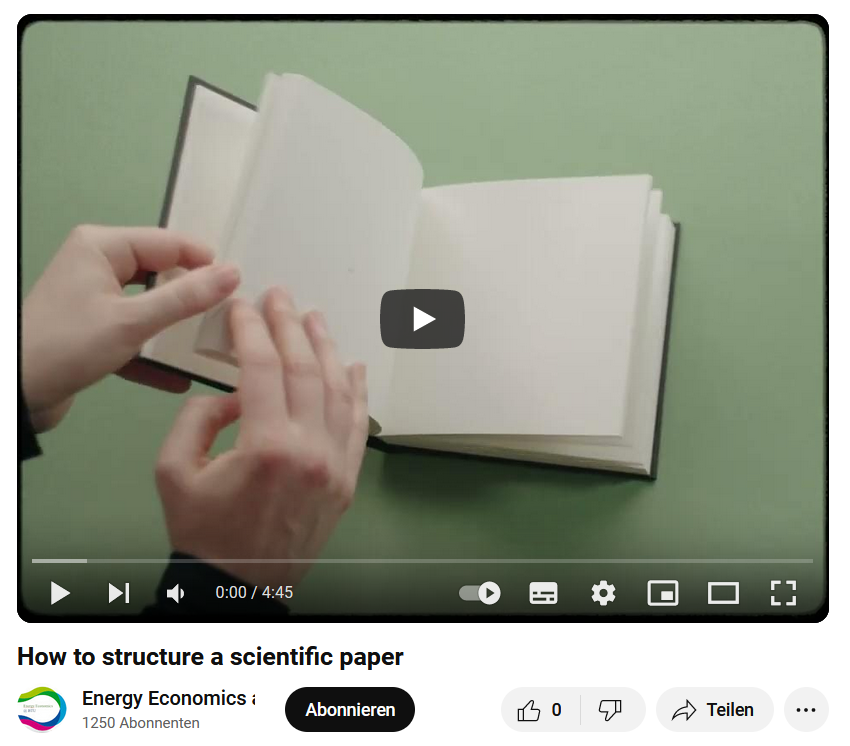
New video published "How to structure a scientific paper"
We are pleased to present our latest video "How to structure a scientific paper"! In this instructional video, we take you through the basics of scientific writing and show you how to present your research in a structured and effective way.
Whether you're still a student or an experienced researcher looking to improve your writing techniques, this video offers valuable tips and guidance to help you formulate your thoughts clearly and persuasively.
Watch the video now on our homepage and find out how you can optimize the structure of your scientific paper for maximum impact.
Good luck and inspiration with your writing!
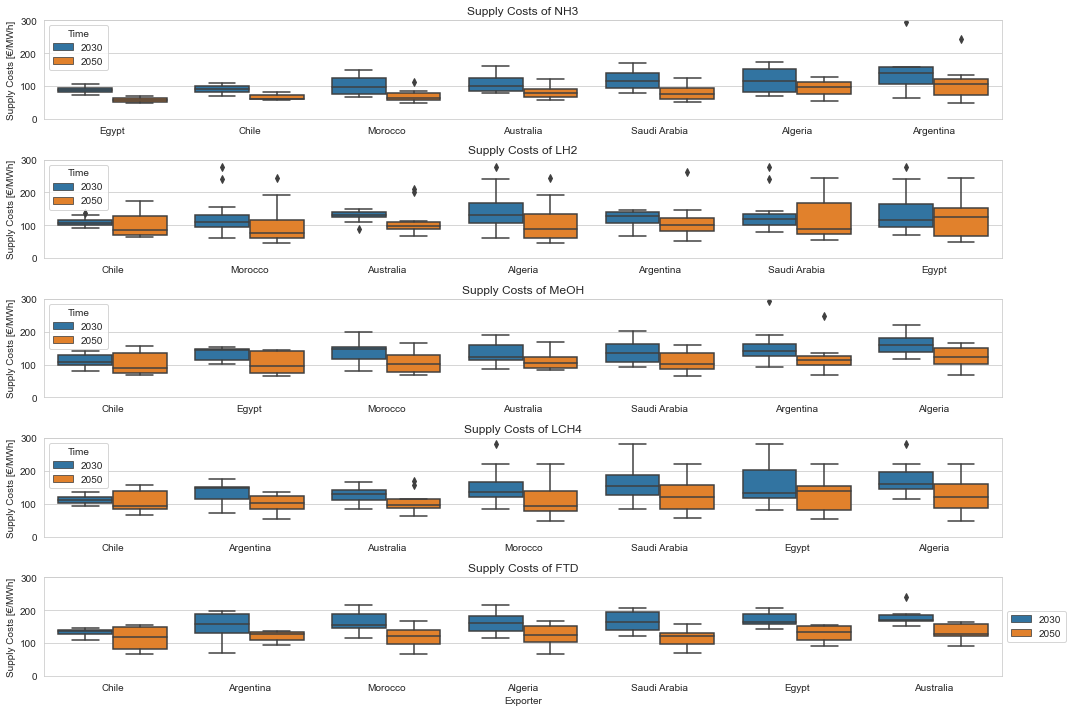
New flagship publication on European hydrogen infrastructure planning published!
Our latest analysis looks at the future of European hydrogen infrastructure planning and focuses on hydrogen and green chemical energy carriers such as ammonia (NH3), liquid hydrogen (LH2), methanol (MeOH), liquid methane (LCH4) and Fischer-Tropsch diesel (FTD).
Important findings from our study are:
1️⃣ Significant cost reductions in green energy sources are expected between 2030 and 2050, which will have a significant impact on European Energy Economics.
2️⃣ Ammonia (NH3) will become a major player for hydrogen expansion due to its dual role as a hydrogen carrier and for direct consumption.
3️⃣ The low-cost sourcing from countries such as Chile, Egypt and Morocco highlights the global dimension of the European energy transition and emphasizes the importance of international cooperation.
Our findings underline the importance of innovation and strategic investment in research and development to accelerate the transition to a sustainable energy landscape. The focus on NH3 opens up new avenues for policy and investment that are in line with EU climate goals. This focus highlights the diversity of energy sources and the need for a nuanced approach to energy transition efforts. This analysis is part of the TransHyDE flagship report, which provides the latest research findings for European hydrogen infrastructure planning. You can access the full article here: https://www.wasserstoff-leitprojekte.de/lw_resource/datapool/systemfiles/elements/files/148FFEF003673B67E0637E695E8625E5/live/document/20240321_European_Hydrogen_Infrastructure_Planning.pdf
New working paper published: The impact of biogas plants on the real estate market
We are pleased to present the latest working paper of the EECON | Energy Economics Lab entitled "Smells like Green Energy - Quasi-Experimental Evidence on the Impact of Bioenergy Production on Residential Property Values"
Together with Christin Hoffmann, Shanmukha Srinivas Byrukuri Gangadhar and Felix Muesgens, we dive into the relationship between bioenergy production and property values and gain recent insights into the public acceptance of renewable energy.
The research used an improved difference-in-difference methodology that provides richer insights compared to traditional two-way fixed effects analysis. As a key finding, the study shows a significant negative impact of bioenergy production on property values, with this impact decreasing with increasing distance to the annex (0.5 km to 3 km). In particular, medium-sized bioenergy plants show a strong negative impact on real estate prices.Gaseous biogas plants have a significant negative impact on real estate prices compared to solid or liquid bioenergy plants, with this impact decreasing with increasing distance.
Read the full working paper to explore the details and implications of our research.
Energy Economics research seminar starts again!
The Chair of Energy Economics is pleased to announce that the Energy Economics research seminar will resume from April 09, 2024. The scheduled sessions will take place on Tuesdays at 17:00 either in face-to-face or online format.
The face-to-face sessions will take place in Building 3E Room 2.26-2.27.
To access the online sessions, follow this Webex Event link: https://b-tu.webex.com/b-tu/j.php?MTID=m5b79563ae11f762b508756b9e4cda022
Meeting number: 2785 199 7036 Password: mrUvNGgP278
The internationally renowned scientists will give their presentation in English on these current topics, among others:
"Exploring Long-Range Dependence through Structured Multifractality in Electricity Markets"
"Collection policy analysis for retired electric vehicle batteries: Evidence from China"
"Evaluating the Effectiveness of Sustainable Transport Alternatives in Reducing Car Use: A Large-Scale Field Test"
We look forward to a lively exchange and your participation! Please always join the Webex meeting with the camera on and the microphone muted.
Further information can be found here.
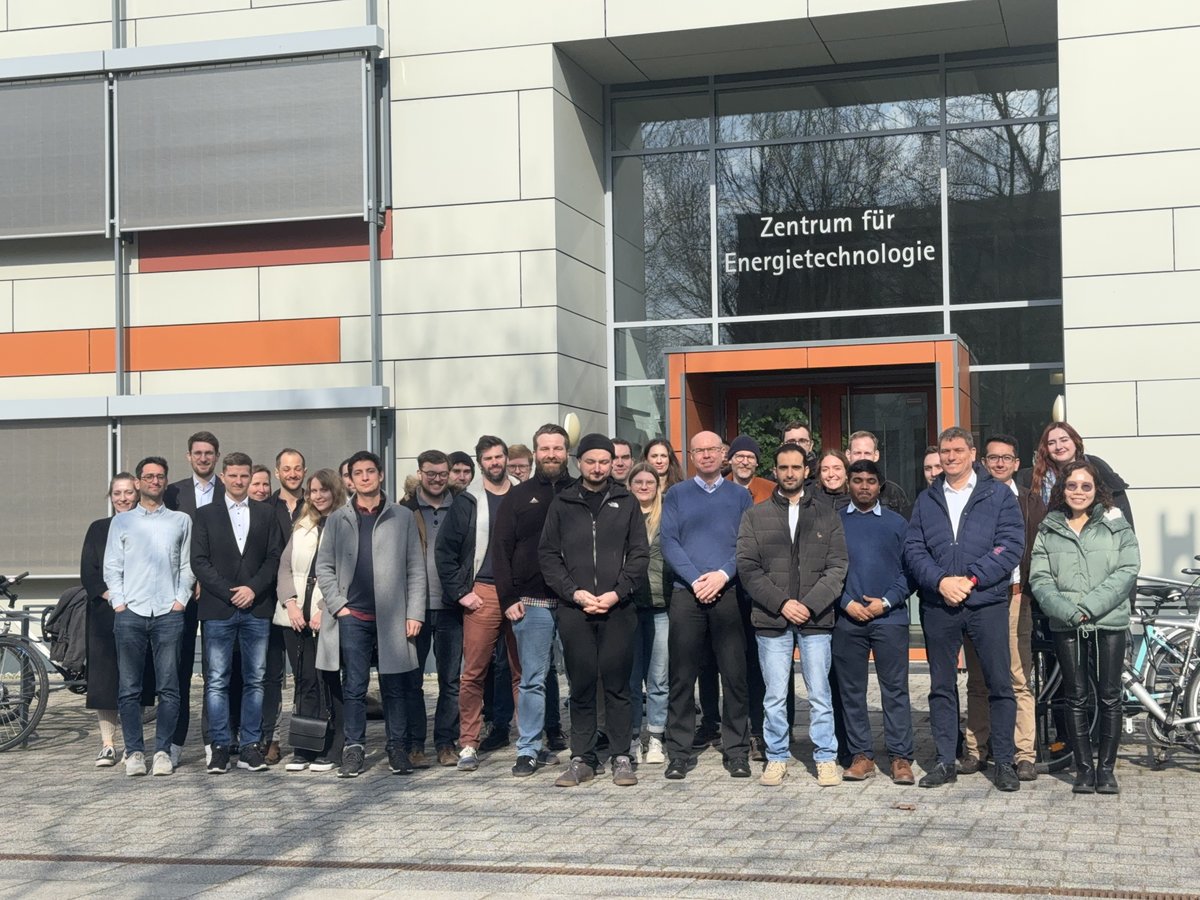
Successful exchange: Thanks to everyone for a conjoint Doctoral Seminar of TU Dresden and BTU Cottbus-Senftenberg!
We would like to thank all participants, officers and guests for their participation in the doctoral seminar on 05.03.2024 at the BTU Cottbus-Senftenberg. Your active participation and the qualified discussions contributed to a successful and insightful exchange.
The program covered a wide range of current topics that are currently being researched at the Chairs of Energy Economics in Cottbus and Dresden. These included the analysis of the potential of ammonia in the German energy transition, the investigation of hydrogen and electricity demand in energy-intensive industries and a case study on tolls as an alternative to fuel tax in times of electromobility.
Special thanks go to our officers for their expertise and contribution to the discussion. We look forward to the next seminar and will stay in touch for further joint projects, events and initiatives.
Thank you again for your interest and commitment!
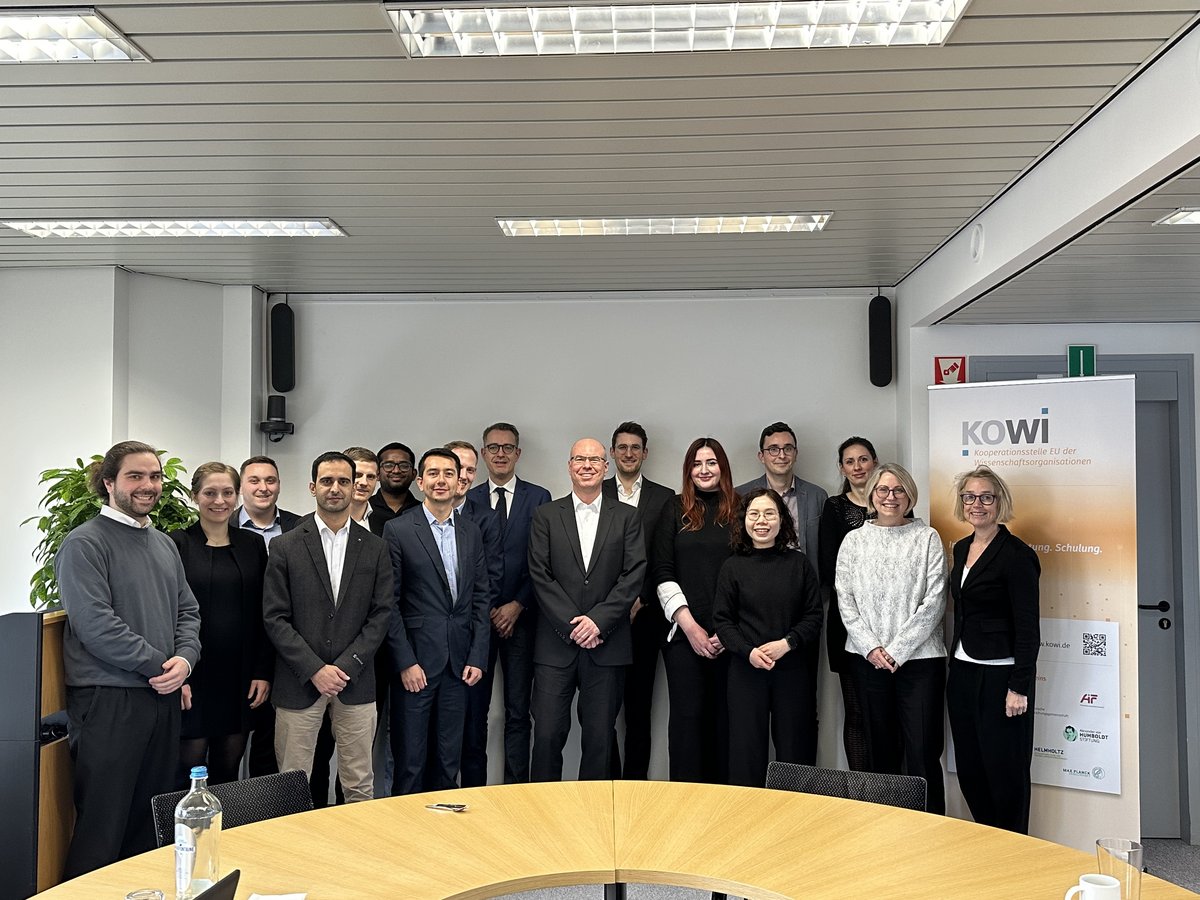
Exploring EU Research Funding in Brussels
From February 27 to 29, 2024, our team embarked on a fruitful journey to Brussels for a Workshop on EU Research Funding at KoWi, the network for European Research Funding. The agenda was packed with insightful sessions, discussions and leisure activities.
The first day kicked off with a warm welcome and an informative exchange led by Prof. Dr. Christiane Hipp and Mareike Schmitt. The evening featured a diverse range of Egg Timer Sessions, introducing projects like the Energy Innovation Center (EIZ) and the Energy Economics Lab (EECON) to the European Union Partners.
The second day commenced with a welcome from Dr. Torsten Fischer (head od KoWi) and an enlightening session on EU funding by Mareike Schmitt. The day unfolded with more Egg Timer Sessions, covering topics from behavioral feedback to bioenergy and local acceptance.
A highlight was the presentation by Karsten Krause on EU energy policy and its synergy with science. The day concluded with valuable insights from Steinar Grynning on SINTEF's activities in EU projects and a captivating presentation by Ivan Matejak on the European Energy Research Alliance (EERA).
The trip wasn't all work; participants enjoyed joint dinners at "Wolf food market" as well as a group visit to the European Parliament and the House of European History.
Citizens' examiner on hydrogen: EECON | Energy Economics Lab presents innovative insights in virtual reality
As part of theCity of Duisburg'sfirst Citizens' Councilin May 2023, a groundbreaking citizens' examiner's reporton the topic of #hydrogenwasdrawn up. This examiner's report was presented to the city in November 2023. Immerse yourself in our short film to learn more about the process and the involvement of the EECON | Energy Economics Lab and our research using #VirtualReality: Link to short movie.
Further information can be found at: Link to further information.
Prof. Müsgens interviewed by Deutschlandfunk Kultur: "Electricity line at a snail's pace - plans for Südlink presented 10 years ago"
The future of the power lines and the challenges involved in implementing the Südlink project are the focus of an informative radio interview with Professor Felix Müsgens published on Deutschlandfunk Kultur.
The interview sheds light on the background and challenges facing the ambitious Südlink project. Since the plans were presented a decade ago, the implementation has proven to be lengthy and complex. In the interview, Prof. Müsgens offers insights into the developments, hurdles and current positions regarding the planned power line.
The contribution, which is available on the Deutschlandfunk Kultur website (link to the program), offers listeners the opportunity to find out more about the background and possible effects of the Südlink route. Among other things, the technical, economic and social aspects of this important infrastructure project will be discussed.
Media representatives and interested parties can access the full interview on the Deutschlandfunk Kultur website. Prof. Müsgens is available for further information or interview requests.
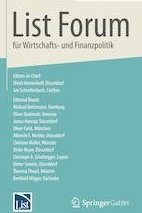
New publication in List Forum für Wirtschafts- und Finanzpolitik: “Is Germany on track to achieve 2030 climate and energy targets?”
Highlights:
- We use an energy system model parametrised to reflect the 2021 energy market situation i.e., before Russia’s attack
- Our study investigates the possibility that Germany will meet its 2030 climate targets
- We provide a qualitative analysis on how results can change in light of recent events
- Our policy recommendations suggest establishing a carbon price floor that can be dynamically changed in response to the evolution of other market forces and policies
You can find the full article at here: https://link.springer.com/article/10.1007/s41025-023-00255-0

We are excited to welcome Pascal Fröhlich as our newest addition to the scientific staff at EECON | Energy Economics Lab. He holds a M.Eng. from Brandenburgische Technische Universität Cottbus-Senftenberg in Electrical Engineering with specialization in Energy Technology. During his dual studies he worked as an engineer in testing rotating machines and planning projects in energy supply at EMIS. As part of the EECON Lab his research focuses on energy system modelling related to life-cycle assessment.
„With great anticipation I will start as a part of the EECON Lab, where not only new challenges await but also the opportunity to collaboratively research and participate the future developments in the field of energy with an enthusiastic team.”
Energie-Innovationszentrum Cottbus (EIZ)
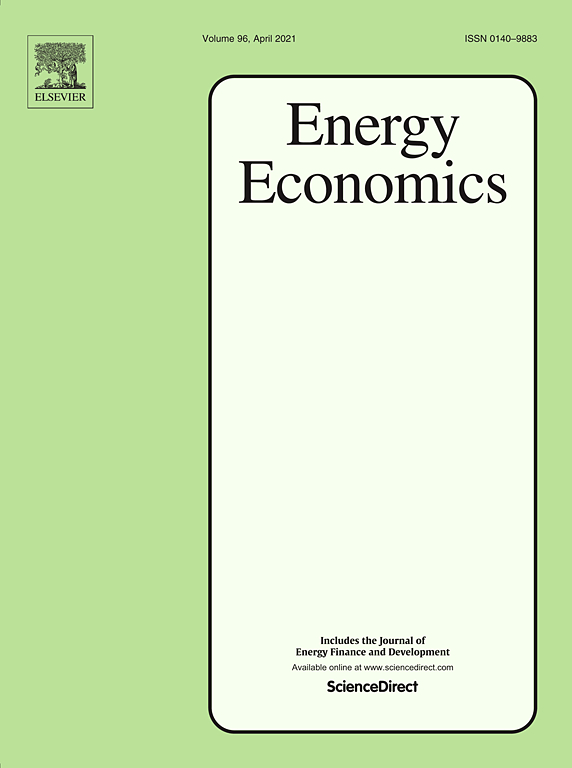
New publication in Energy Economics: “Risk aversion and flexibility options in electricity markets”
Highlights:
- Large-scale stochastic transmission and generation expansion model.
- Analysing the effect of risk aversion on the investment decisions.
- Examining the individual effects of three flexibility elements on decision making.
- Flexibility elements considered: demand response, grid capacity and energy storage.
- Examining the interplay between flexibility elements.
- Publicly available dataset and source code for the entire project.
You can find the article at link

We are excited to welcome Diego Alejandro Prieto Melo to our academic team at the Energie-Innovationszentrum Cottbus (EIZ). Diego holds a M.Sc. from Brandenburgische Technische Universität Cottbus-Senftenberg in Environmental & Resource Management and transferred back to #Cottbus after working as a Research Assistant at the PIK - Potsdam Institute for Climate Impact Research. As part of the EECON | Energy Economics Lab his research focuses on analyzing and understanding the evolution of renewable energy generation capacity in Germany.
“I am thrilled to be part of the EECON Lab, as it gives me the opportunity to contribute to the energy transition in Germany through research in an interdisciplinary environment, working together with colleagues who are passionate about building a sustainable future.”
#energytransition #reaseach #boomtown

A sunny view of renewable and conventional energy sources on the #CottbuserBaltic Sea today at the #CDISummerSummit . We were able to take a look at the future Baltic Sea and the planned harbor district via #virtuellescottbus . More about this here: https://lnkd.in/eFzCwxJt
Thanks to Cluster Decarbonization of the Industry (CDI) for the organization and WHITESTAG - VR Filmproduktion for providing the VR scenario.
Energy Innovation Center Cottbus (EIZ)
#energy transition #decarbonization #cottbus #lausitz
German Offshore Wind Energy Auctions: Competition and Challenges
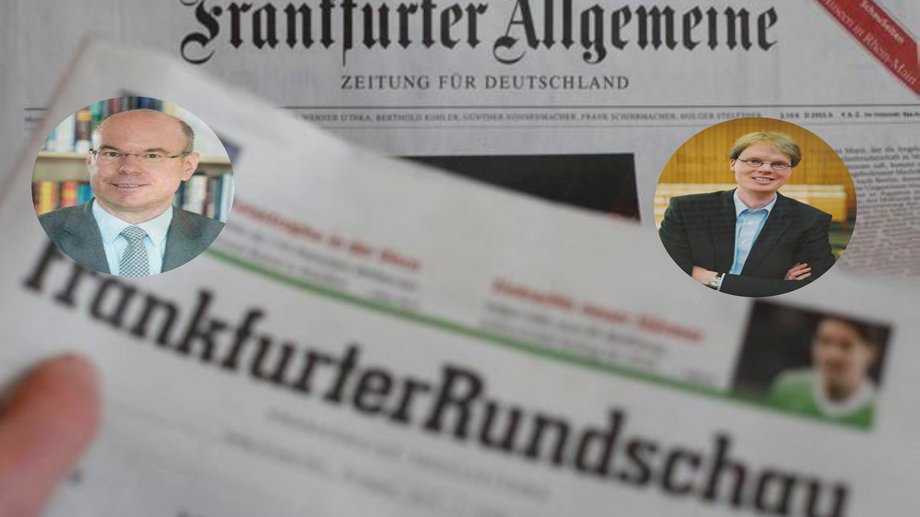
In an interview with the newspaper Frankfurter Allgemeine, Prof. Felix Muesgens and Prof. Axel Ockenfels provided valuable insights into offshore wind energy
When it comes to restructuring the German electricity industry, policymakers rarely rely on the market. Too often, they get lost in a thicket of regulations and subsidies, miss their targets and drive up electricity prices for consumers. Occasionally, however, competitive elements come into play. One of these is purchasing auctions for renewable electricity: whoever offers the cheapest green power wins the bid.
The latest success of the competitive process was seen in the recent wind offshore tenders in Germany. The rights to build 7,000 MW of offshore wind power were sold for €12.6 billion. Mind you, these are not subsidies for wind power, but payments by the companies for the right to produce offshore wind power. The grid connection is paid for by the state. The revenues from the auction are used to finance the grid connection, relieve the burden on electricity customers and protect the marine environment as best as possible.
Despite this good news, there are voices who, in view of the surprisingly high price bids, want to change the tender rules and push competition back again. In particular, according to the proposal, the maximum level of auction prices should be limited in the future. The fear behind this is that wind power producers could demand high electricity prices on the wholesale market in response to high auction prices, so that their revenues are high enough to pay the auction price. However, this argument not only contradicts the logic of business management (companies do not seek to maximize profits only when costs are high), but is also based on a misunderstanding of how competitive electricity markets work (already "sunk" investment costs, which include auction expenses, do not play a role in price formation). More likely than rising wholesale prices as a result of the tender is that the additional feed-in from the new wind turbines will cause the wholesale price to fall in many hours. In addition, given the high revenues, it is conceivable that policymakers will now bring more offshore wind sites to the market more quickly and more often. Another argument against auction pricing is that the winning bidders may have been too optimistic in their assumptions (at least more optimistic than the losing bidders) and therefore their price bids were 'inflated' in the tender. This phenomenon is sometimes referred to as the 'winner's curse' and can indeed lead to problematic auction results. However, it is also true that investors can miscalculate in virtually any investment decision, from buying mobile spectrum in the telecommunications sector to buying stocks for retirement. Even if the state wanted to protect investors from such investment risks, a price cap in the auctions would be inappropriate for this purpose. The state cannot assess the market value of wind licenses any better than the companies. If it were otherwise, it would not need an auction to set the price and could instead set the selling price directly. Moreover, it remains unclear how the government should ration wind licenses if demand exceeds supply when the price cap is reached. In any case, a lottery or complex individual negotiations with suppliers are not attractive alternatives, as they may weaken competition, lead to inefficient allocation, increase electricity costs, and lead to increased lobbying.
Investors in power generation capacities are best protected by a stable and reliable energy policy. Risks, e.g. with regard to future electricity price developments, can be hedged on the electricity market. If the state wanted to assume the entrepreneurial risks (for which there are few reasons here), instruments suitable for competition would also be available for this, e.g. indexing auction payments to future electricity prices.
However, there is also justified criticism. In wind auctions, the winners have to make only a small payment to the government compared to the size of the project if it is abandoned. But if the winners can get rid of their obligations at relatively low cost, financially strong bidders might see this as an invitation to consider wind licenses as an option rather than an obligation to build wind turbines: Only if the business and political conditions develop positively will investments then actually be made. As a result of auction obligations that are not very reliable, there is an increased risk that plants will not be realized and national climate plans will be put in jeopardy. Only recently, the Swedish utility Vattenfall announced its withdrawal from the development of the Norfolk Boreas offshore wind project with a capacity of more than 1,000 megawatts off the British coast, justifying this with the increased construction costs. However, these and other criticisms should not lead us to question competitive pricing altogether, as they can be addressed through smart auction design.
Find the news article here
Prof. Dr. Felix Müsgens in VEE Sachsen e.V. Webinar
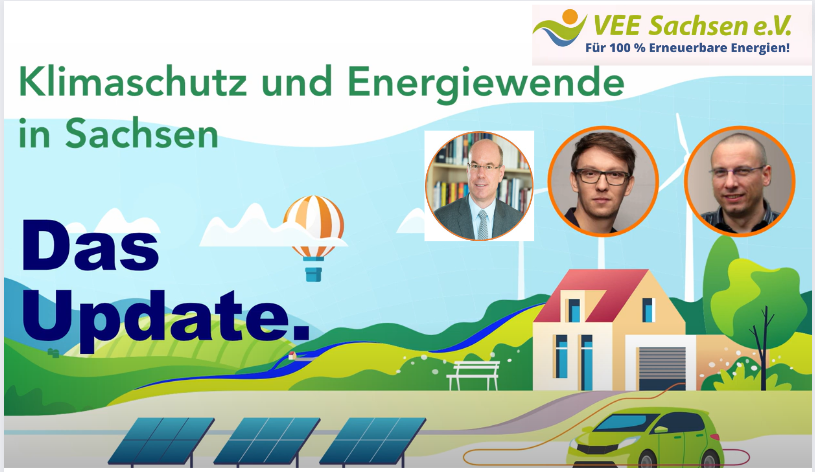
In a webinar with VEE Sachsen e.V., Prof. Müsgens gave a presentation on the topic of green base load for industry.
VEE Sachsen e.V. is a network with the aim to support the promotion of the use of renewable energies.
The presented findings are a result of a cooperation with 50Hertz and Fraunhofer IEG.
After the completion of this preliminary study, the main focus is now on the realization of a full-scale research project with industry partners.
- The "10-Cent challenge" is in reach.
Watch the webinar here.
Our latest publication in the Journal of Hydrogen Energy: "Supply costs of green chemical energy carriers at the European border: A Meta-analysis
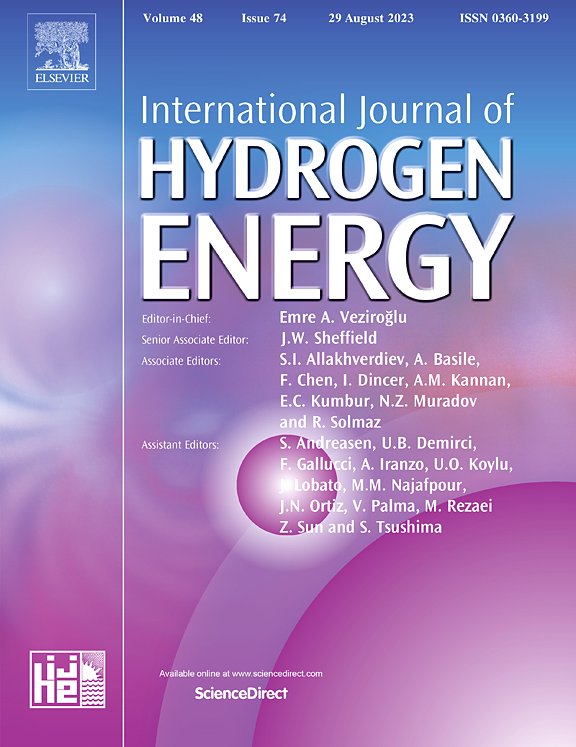
The paper overview,
- a meta-analysis of 30 studies, providing a detailed database on supply costs and parametric assumptions.
- Our projections show that supply costs for all energy carriers could vary by 4x in 2030 and by 5x in 2050, primarily driven by production costs.
- Significant parameters for production costs were identified as the weighted average costs of capital and capital expenditures of electrolyzers and conversion.
- Transport costs were found to have a significant dependence on the choice of energy carrier and the weighted average costs of capital.
You can find the publication at Link
Scientific Advisory & Project Board meeting with the topic "Green base load for industry needs electricity storage".
As part of a preliminary study commissioned by the transmission system operator 50Hertz, the results on the topic of "Green base load for industry" were presented by the BTU Cottbus-Senftenberg and the Fraunhofer Institute for Energy Infrastructures and Geothermal Energy. This was done during the Scientific Advisory & Project Board meeting on June 21, 2023. 50 Hertz spoke to various companies for the study. The tenor was clear: there is a high level of interest in the topic of "green base load". A crucial point for the companies is that the geographical areas from which the renewable electricity comes are not too narrow when implementing such a project. This increases flexibility and resilience, for example against storms," emphasizes Prof. Dr. Felix Müsgens from BTU Cottbus-Senftenberg.
The key findings of the study are:
- Aggregate RE capacity between 6.3 MW and 7.6 MW is needed to provide 1 MW of green baseload. Short- and long-term storage technologies, as well as sector coupling technologies, play a critical role in limiting the overbuilding of needed renewable generation capacity.
- The cost of 10 cents/kWh is achievable with a renewable share between 90-95% of electricity.
Follow this link to the press release.
New publication in Energy Systems: Toward improving power system models through better load forecasting.
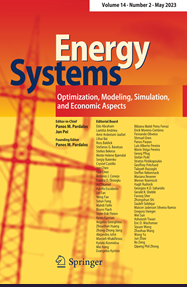
The article 'Enhancing energy system models using better load forecasts' shows how energy system models can be improved by improving the input data. For this purpose, we develop time series models to improve the load forecast data of the transmission system operators and analyse how the increased data quality affects the quality of the results of an energy system model.
You can find the article link
Launch of the Energy Innovation Centre for the Climate-Neutral Energy Supply of the Future (EIZ)
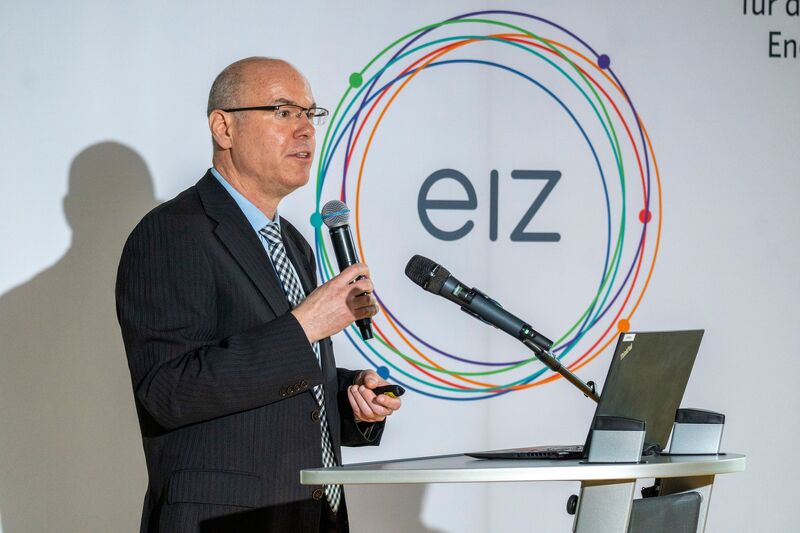
The global climate targets require effective and efficient CO2-neutral management of all sectors. Linking the areas of electricity, heat, transport and industry in such a way that the fluctuating electricity generation from renewable energies can be used optimally is one of the goals of the scientists at BTU Cottbus-Senftenberg. More than 90 researchers from 14 disciplines are developing innovative technologies for a climate-neutral energy supply in a new research cluster in a total of six networked labs together with an interdisciplinary partner network. The Energy Innovation Center at BTU, which is funded by the German Federal Ministry of Education and Research (BMBF) with up to 28 million euros for its first phase, aims to provide global impetus in the networking of different energy systems and the associated global restructuring of the energy sector. Prof. Dr. Felix Müsgens, project manager of the Energy Innovation Center Cottbus (EIZ) and head of the BTU department #Energiewirtschaft: "In the Energy Innovation Center, we work on the scientific issues of the energy transition and make important contributions to both basic and application-oriented #Forschung . At the same time, we are strengthening innovation and start-up competence in the areas of sector coupling and digitalisation."More: https://lnkd.in/edTui62c
Energy Innovation Center of the Brandenburg Technical University in the broadcast of Brandenburger Begegnungen
Prof. Müsgens talks about the newly founded Energy Innovation Center of the Brandenburg Technical University in the broadcast of Brandenburger Begegnungen - Grüne Energie aus der Lausitz.
Follow this link to listen to the broadcast.
Effects of the war in Ukraine on the German energy system
In an interview with the Chinese television station Phoenix, Prof. Müsgens commented on the effects of the Ukraine war on the German energy system.
Follow this link to hear the full interview.
Challenges of the energy transition: Interview with rbb24
In an interview with rbb24, Prof. Müsgens talks about the goals of the energy transition. The goal of generating 80 percent of Germany's electricity needs from renewable energies is certainly ambitious, but it can be achieved if the right technologies are promoted and the bureaucracy involved in project planning is reduced.
Follow this link to hear the full interview.
International Energy Economics Conference 2023 (IEWT) in Vienna.
During a presentation at the International Energy Economics Conference 2023 (IEWT) in Vienna Prof. Müsgens spoke about the effects of the Ukraine war in the energy market. While the war will have a positive long-term impact on climate protection and the energy transition, in the short term, negative consequences of the conflict are still to be expected. The energy transition will be completed more quickly as a result of the event. On the one hand, natura gas has lost its importance as a bridging technology and on the other, the acceptance of renewable energies and their expansion has risen sharply.
You can access the full article and presentation slides here.
Get Into Energy: New R&D Opportunities for Students in Cottbus on February 1st, 2023
On February 1st, 2023 the event Get Into Energy: New R&D Opportunities for Students in Cottbus took place at BTU. The event offered students the opportunity to get in touch with energy research institutes. The event started with a pitch-session in which the Fraunhofer Research Institution for Energy Infrastructures and Geothermal Systems IEG, the DLR Institute of Low-Carbon Industrial Processes, the Energy Innovation Centre (Energie-Innovationszentrum - EIZ), the Center for Hybrid Electric Systems Cottbus (chesco) and the DLR Institute of Electrified Aero Engines were introduced within 5 minutes. Afterwards, students could meet with researchers from the various institutes and exchange contact information. During the get-together, Franziska Penske and Niklas Ziemann from the Chair of Energy Economics presented the research foci of the Energy Economics Lab (EECON Lab) – which is part of the EIZ – to interested students and informed them about the opportunity to become a participant in a laboratory experiment. By doing so, more than 40 participants could be recruited for research studies. If you are also interested in taking part in one of our studies, please find all relevant information (requirements, contact information) in the picture below.
FOCSSI 2 Project Kick-off
On 3rd February 2023, a digital kick-off meeting for the FOCCSI2 project was held between the chair of Energy Economics at BTU and their associated partner TenneT.
The FOCCSI 2 project is a three-year research project funded by the Federal Ministry of Economics and Climate Protection (BMWK).
In the project, we will develop "meta-forecasts" for both PV and wind feed-in based on weighted combinations of individual forecasts using AI and ML methods. The proposed methodology will be applied based on PV and Wind forecasts provided by TenneT data.
New publication in Energy Policy on how CO2 prices accelerate decarbonisation in Germany
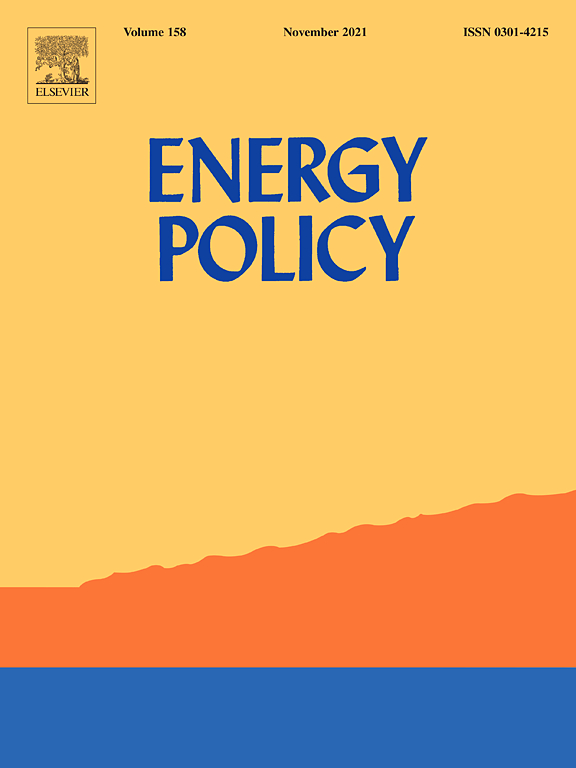
Our new article “How CO2 prices accelerate decarbonisation – The case of coal-fired generation in Germany” provides new insights on how different instruments to reduce carbon emissions impact the development of coal phase-out. We compare instruments to reduce emissions and their impact in the German market. We find that with current CO2 prices, more coal may leave the system than regulation foresees. As a consequence, market forces may reduce employment even faster than planned in the regulation.
You can find the article here.
New publication on wind energy auctions in Germany

Some highlights from the publication "Evaluating the German onshore wind auction programme: An analysis based on individual bids" published in EnergyPolicy's special issue on "Renewable energy auctions - past, present, and future":
- Realisation rates have been low so far – below 50% of awarded projects have been built.
- Secondary objectives (such as acteur diversity) are difficult to translate into design elements, making them even more difficult to achieve.
- A lack of competition has played a major role in keeping subsidy levels high.
- The auction design has reinforced the advantages of large developers.
You can find the article here.
EECON Lab Kick-off
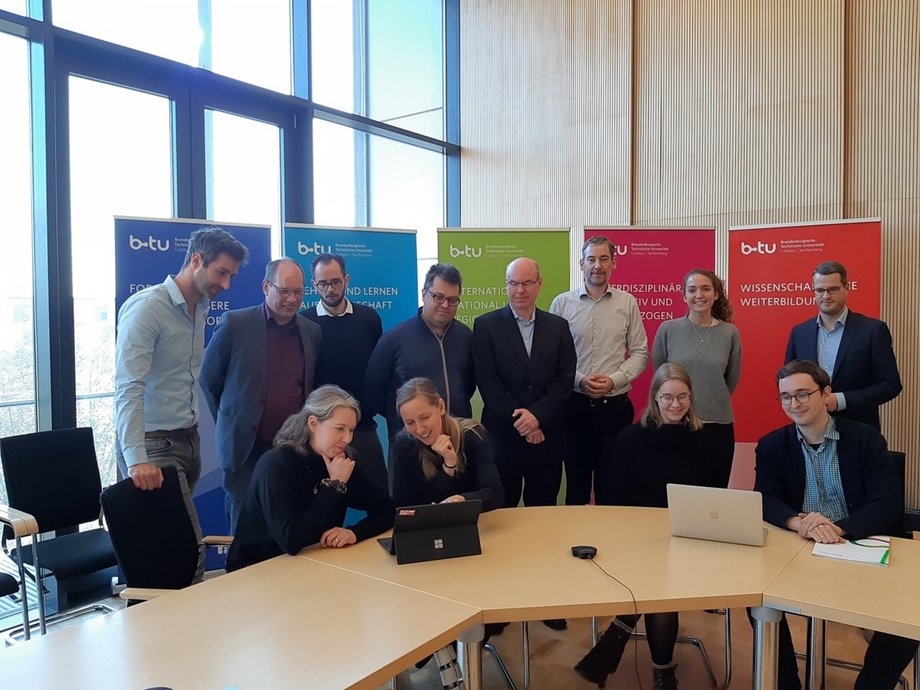
On Tuesday, 15 November, the kick-off of the Energy Economics (EECON) Lab took place. The EECON Lab is one of six labs in the new Energy Innovation Centre (EIZ) of the BTU. Together with the partners Fraunhofer IEG, 50Hertz Transmission GmbH, LEAG, Emis Electrics GmbH and the Fachagentur Windenergie, and with the support of the Brandenburg State Chancellery, the EECON Lab is investigating, for example, the acceptance of and participation in renewable energies, as well as preparing market and competition analyses for companies from the Lusatian energy industry.
The Chair of Energy Economics is pleased to announce that the BTU Energy Innovation Center project has been given the green light.
On Wednesday, October 12, the 1st phase of the project, which is scheduled to run for a total of ten years, was officially launched. With the participation of 14 BTU chairs and more than 40 other partners, researchers are working to understand the climate-neutral energy supply of the future and to facilitate the energy transition in Lusatia, which is expected to successfully phase out lignite.
Our department is working on topics including "acceptance of wind turbines", "energy system modeling under uncertainty" and "artificial intelligence in energy forecasts".
The project launch was heavily covered by regional and national media. You can find further information in the following links.
| Cottbuser Universität forscht für die Energiewende |
| Süddeutsche.de - October 12, 2022 Wissenschaftler der Universität in Cottbus wollen in einem neuen Innovationszentrum an der klimaneutralen Energieversorgung der Zukunft forschen. |
| Cottbuser Universität forscht für die Energiewende |
| ZEIT online - October 12, 2022 ... ) übernommen. Blick über den Campus an der Brandenburgische Technische Universität Cottbus-Senftenberg. © Patrick Pleul/ dpa-Zentralbild/ … |
| Cottbuser Universität forscht für die Energiewende |
| FAZ.NET - October 12, 2022 Wissenschaftler der Universität in Cottbus wollen in einem neuen Innovationszentrum an der klimaneutralen Energieversorgung der Zukunft forschen. |
| Cottbuser Universität forscht für die Energiewende |
| DIE WELT - October 12, 2022 Blick über den Campus an der Brandenburgische Technische Universität Cottbus-Senftenberg. Quelle: Patrick Pleul/dpa-Zentralbild/dpa/ … |
| Innovationszentrum: Cottbuser Universität forscht für die Energiewende |
| Focus Online - October 12, 2022 ... den Campus an der Brandenburgische Technische Universität Cottbus-Senftenberg. Wissenschaftler de r Universität in Cottbus wollen in einem … |
| Neues BTU-Institut erhält Millionenförderung von Bund und Land |
| rbb Rundfunk Berlin Brandenburg - October 12, 2022 ... : imago-images/Mario Hösel Die Brandenburgische Technische Universität Cottbus-Senftenberg (BTU) hat am Mittwoch eine Millionenförderung … |
| Förderbescheid für das Energie-Innovationszentrum der BTU Cottbus-Senftenberg |
| rbb24 | Brandenburg aktuell | Nachrichten II | 19.30 Uhr - October 12, 2022 Förderbescheid für das Energie-Innovationszentrum der BTUCottbus-Senftenberg |
| Brandenburgische Technische Universität Cottbus-Senftenberg hat weiteren Förderbescheid erhalten |
| rbb24 | 21:45 Uhr | Nachrichten II - October 12, 2022 Brandenburgische Technische Universität Cottbus-Senftenberg hat weiteren Förderbescheid erhalten |
| Cottbuser Universität forscht für die Energiewende |
| Berliner Zeitung - October 12, 2022 ... - Blick über den Campus an der Brandenburgische Technische Universität Cottbus-Senftenberg. a/Archivbild Cottbus - Wissenschaftler de r … |
| Forschung zur Energie der Zukunft |
| Potsdamer Neueste Nachrichten - October 13, 2022 Uni Cottbus bekommt Innovationszentrum |
| Mehr Forschung in der Lausitz |
| Sächsische Zeitung Hoyerswerda - October 13, 2022 Wissenschaftlerinnen und Wissenschaftler der Brandenburgischen Technischen Universität Cottbus-Senftenberg (BTU) und eines interdisziplinären Partnernetzwerks entwickeln innovative Technologien für eine klimaneutrale Energieversorgung. Wissenschaftlerinnen und Wissenschaftler der Brandenburgischen Technischen Universität Cottbus-Senftenberg (BTU) und eines |
| Förderung für neues Energie- Innovationszentrum in Cottbus |
| MAZ-Online.de - October 12, 2022 Wissenschaftsministerin Schüle fördert Cottbuser Energiezentrum MIt 18,5 Millionen Euro Startkapital wird in Cottbus der Grundstein für Forschung und Entwicklung zur Energiewende gelegt. |
| Innovationszentrum an Uni in Cottbus gestartet |
| Sächsisches tageblatt - October 13, 2022 Wissenschaftler der BTUCottbus/Senftenberg wollen an der klimaneutralen Energieversorgung der Zukunft forschen. Gestern ist ein neues … |
| Innovationszentrum: Cottbuser Universität forscht für die Energiewende |
| Augsburger Allgemeine - October 12, 2022 Blick über den Campus an der Brandenburgische Technische Universität Cottbus-Senftenberg. Foto: Patrick Pleul/dpa-Zentralbild, dpa ( … |
| Cottbuser Universität forscht für die Energiewende |
| Münchner Merkur - October 12, 2022 Blick über den Campus an der Brandenburgische Technische Universität Cottbus-Senftenberg. © Patrick Pleul/dpa-Zentralbild/dpa/ … |
| Jobs in Brandenburg: Start für Energie-Innovationszentrum an der BTU in Cottbus - Fachkräfte gesucht |
| Lausitzer Rundschau - October 12, 2022 ... neue Arbeitsplätze hatte die Präsidentin der Brandenburgischen Technischen Universität (BTU) Cottbus-Senftenberg , Prof. Gesine Grande, … |
| Start für Energie-Innovationszentrum an BTU |
| Lausitzer Rundschau Cottbus, sieben weitere Ausgaben und Online - October 13, 2022 Der Lausitz Science Park (LSP) in Cottbus wird zum Jobmotor. Mit dem Start für das Energie-Innovationszentrum (EIZ) an der BTU geht das größte Wissenschafts-Projekt im Lausitzer Strukturwandel in eine neue Phase. Gebraucht werden viele Fachkräfte. |
| Cottbuser Universität forscht für die Energiewende |
| Volksstimme.de - October 12, 2022 Wissenschaftler der Universität in Cottbus wollen in einem neuen Innovationszentrum an der klimaneutralen Energieversorgung der Zukunft forschen. |
| 102 Millionen Euro für die zukünftige Energiemodellregion Lausitz |
| Informations Dienst Wissenschaft - October 13, 2022 ... -Cluster Wissenschaftler*innen der Brandenburgischen Technischen Universität Cottbus-Senftenberg (BTU) und eines interdisziplinären … |
| RT @ManjaSchuele: Lausitz = #Energieregion der Zukunft! Bald kommen aus dem neuen #EnergieInnovationszentrum der @BTU_CS wegweisende |
| RT @ManjaSchuele: Lausitz = #Energieregion der Zukunft! Bald kommen aus dem neuen #EnergieInnovationszentrum der @BTU_CS wegweisende |
| 102 Millionen Euro für die zukünftige Energiemodellregion LausitzWissenschaftsministerin Dr. Manja Schüle und Sandra Langhof-Siewert von |
| Ministerin @ManjaSchuele & Sandra Langhof-Siewert (@staatskanzleibb) übergeben den Zuwendungsbescheid ans neue Energie-Innovationszentrum |
Germany saves gas
In an interview with mdr Wissen, Prof. Müsgens talks about how the lack of direct price signals for gas consumers makes it more difficult to implement saving measures. In particular, he criticizes efforts to cap prices, as this would remove the signals to reduce consumption.
You can read the full article here.
Gas price cap - can we square the circle?
In interview with Radioeins, prof. Müsgens discusses the decision of the German gas commission on a relieve package for Gas consumers to tackle the high fuel prices.
The policy's double objective of relieving gas consumers of the monetary burden while still preserving the incentives to save gas is described as trying to square a circle.
Follow this link to listen to the full interview.
Gas shortage: Bavaria faces problems with electricity, the East with heat
In an interview with MDR Prof. Müsgens comments on the effects of the gas shortage on the electricity and heat availability in Bavaria and east Germany.
While the gas situation is still stable, additional system stress could materialize in winter exposing Germany to an energy crisis.
You can read the full article here.
Doctoral Colloquium Dr. Thorsten Engelhorn
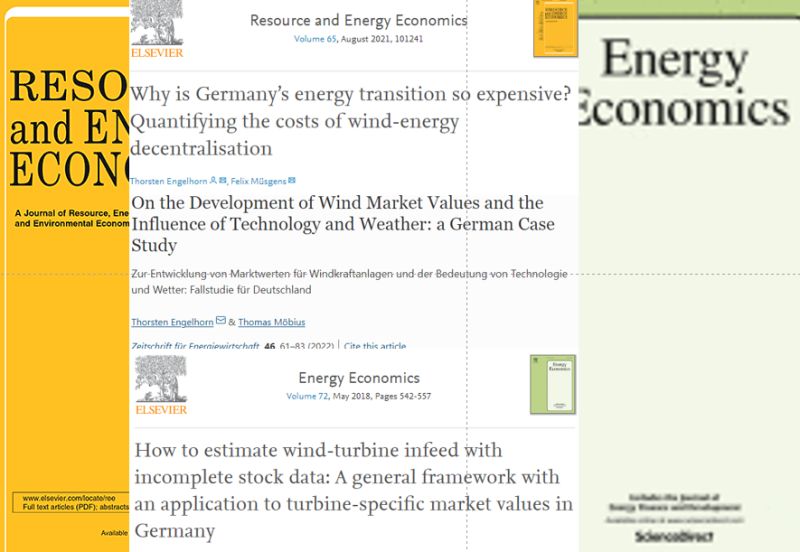
The Chair of Energy Economics is pleased to announce that on 19.07.22 our external PhD student Thorsten Engelhorn has successfully defended his dissertation "On the value of the wind's infeed and the costs of capacity built-up: a bottom-up modelling for the German market" . We wish Dr. Engelhorn all the best for his upcoming tasks and a successful career.
A new paper from Thi Ngoc Nguyen and Prof. Felix Müsgens on the quatitative comparison of methods for PV forecasting has been published in the Applied Energy Journal
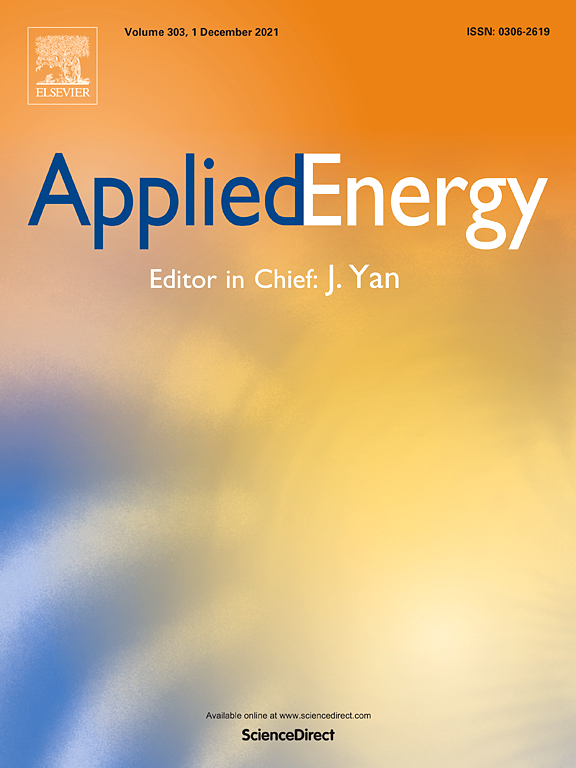
Some highlights from the publication “What drives the accuracy of PV output forecasts?” include:
- Combining methodologies (hybrid models) achieve the lowest errors.
- ML models do not show a robust performance but have the fastest improvement.
- Using data processing techniques reduces forecast errors.
- Forecast horizon and test set length positively correlate with forecast errors.
- The possibility of “cherry picking” in reporting errors is observed.
You can find the article here
Doctoral Colloquium Dr. Iegor Riepin
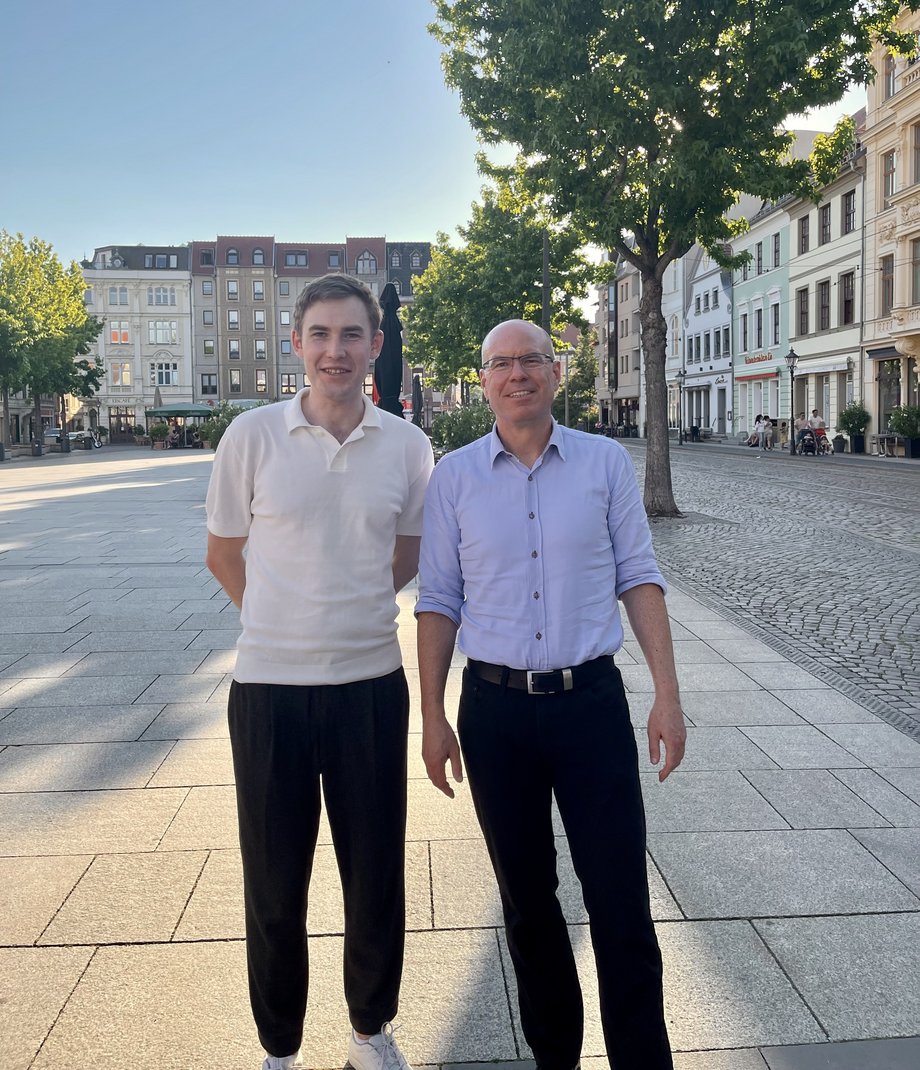
The chair of Energy Economics is pleased to announce that on 23.06.22 our colleague Iegor Riepin succesfully defended his PhD Thesis "Modeling challenges of modern energy markets: studies on uncertainty, complexity, and constant change". We wish Dr. Riepin all the best for his upcoming work commitments and a successful career.
A new paper on auctions for wind offshore

Some highlights from the publication “Policy choices and outcomes for offshore wind auctions globally” published in Energy Policy include:
- Global stock-taking of offshore wind auctions through statistical analysis.
- Auctions expected to dominate procurement in future, with estimated share of 97%.
- Describing auction designs and outcomes for most of the 53.4 GW auctioned to date.
- Auction designs show a wide range of policy choices, embedded in regional contexts.
- Revenue stabilisation is a key procurement feature, especially in nascent markets.
You can find the article here
Price shock due to Ukraine war
In an interview with FOCUS online, Prof. Müsgens talks about the impact of high wholesale energy prices on household tariffs. In the next two years German households should experience even higher prices.
You can read the full article here or on FOCUS online.
A new working paper by Smaranda Sgarciu, Daniel Scholz and Prof. Felix Müsgens on how carbon prices accelerate decarbonisation has been published
The paper, "How CO2 Prices Accelerate Decarbonisation - the Case of Coal-Fired Generation in Germany", compares two types of coal phase-out instruments. Namely i) direct regulatory intervention and ii) market-based CO2 pricing instruments.
Some highlights are:
1. rising CO2 prices can make coal-fired generation unprofitable and thus accelerate the coal phase-out.
2. CO2 pricing instruments lead to a trade-off between accelerating the coal phase-out and accelerating the employment reduction in the coal sector.
You can find the article here
Panel discussion at the Brandenburg's Energy Day
Within the framework of the Brandenburg Energy Day at the BTU cottbus, ZEIT ONLINE reported on the uncertain future of the Schwedt oil refinery in the face of a halt of Russian oil imports. In the same line, Prof. Müsgens commented that the situation with Russia will further increase energy prices for end-consumers and a short-term moratorium on the phase-out of coal-fired plants should be considered.
You can read the full article here or on the ZEIT website.
Energy Day of the State of Brandenburg at the BTU
At the Energy Day of the State of Brandenburg at the BTU in Cottbus, Brandenburg's Energy Minister Jörg Steinbach, Jürgen Fuchs (Chairman of the Board of BASF Schwarzheide), Rüdiger Kuhn (Chairman of the Board of CEMEX), Olaf Höhn (Managing Director Florida Eis Manufaktur), Prof. Dr Felix Muesgens (BTU Cottbus-Senftenberg) and LEAG board member Thorsten Kramer on ways to transform Brandenburg's economy in a climate-friendly way - while ensuring security of supply and moving away from Russian gas and oil imports.
Before it gets cheaper, it gets even more expensive
In an interview with "Die Zeit", Prof. Müsgens talks about the impact of high wholesale energy prices on household tariffs. According to the high forecasts for next year, German households can only expect higher prices.
You can access the full article here or in the Zeit webpage.
Expensive energy - energy price crisis?
In an interview with rbb, Prof. Müsgens comments on the skyrocketing electricity prices. High gas and oil prices as a result of the sanctions against Russia and market speculation are the underlying reasons.
Watch the full video on our YouTube channel and on the rbb website.
Why an oil embargo would hit eastern Germany particularly hard
In an interview for MDR Prof. Müsgens comments on the implications of an embargo on Russian oil on the German market.
The article can be found here or in the MDR portal
Can Germany stop buying Russian coal?
In an interview with the Zeit newspaper, Prof. Müsgens discusses the implications of the economic sanctions imposed to Russia on the coal prices and its effects for Germany.
You can access the full article here or in the Zeit webpage.
Prof. Müsgens discusses the implications of the German dependency on Russian fuels in an interview for Märkische Allgemeine (MAZ)
In an interview for Märkische Allgemeine (MAZ) Prof. Müsgens discusses the dependency of Germany and Europe on Russian gas and oil, the future of lignite and the possibilities of saving energy.
In his opinion, regarding the expansion of sanctions against Russia, the West should focus on the issue of oil, since Russian revenues from oil exports are three times as high as those from gas exports. Also, Germany would more easily cope with a supply stop of Russian oil than a stop on gas supply.
A long version of the interview is available here, a short version here.
Doctoral Colloquium Dr. Sebastian Kreuz

The chair of Energy economics is pleased to inform that on the 21.02.2022 Dr. Sebastian Kreuz succesfully defended his Doctoral dissertation on “Five Studies on Recent Topics in Energy Economics”. We wish him a fruitful career and all the luck in future professional endeavors.
Prof. Müsgens comments on the implications of the Ukrainian war in the German energy system
In an interview with rbb, Prof. Müsgens discusses the implications of the Ukrainian war for the German electricity system. Due to the high dependancy of Germany on Russian gas imports problems from increased prices to system security. Greater presures will be met in the short-term, and Germany needs to adress solutions and alternatives to face next winter.
See the full video on our YouTube channel and also on the rbb website.
Earlier coal phase-out?
In an interview for the Deutsche Presse-Agentur (Die Zeit newspaper), Prof. Felix Muesgens explains how an earlier coal phase-out is possible. He talks about the market conditions and political requirements necessary for this.
You can find the article here
Earlier coal phase-out possible under conditions
In an interview with ntv, Prof. Felix Müsgens comments on Germany's coal phase-out policy and its feasibility, taking into account market flexibility options and plans to expand renewables.
You can read the full article here
Prof. Müsgens gives his opinion on the extreme rise of gas prices to rbb
The rbb reports on the newly converted gas fired power plant in Cottbus and the effects of high gas prices on electricity prices. In the video, Prof. Müsgens explains why gas prices have gone so high up and the expectetions in the short and long term.
You can watch the video on our YouTube channel and also on the rbb website.
A new paper from Dr. Dragana Nikodinoska, Mathias Käso and Prof. Felix Müsgens on day-ahead PV and Wind forecasts has been published in the Applied Energy Journal

Some highlights from the publication “Solar and wind power generation forecasts using elastic net in time-varying forecast combinations” include:
- The used methodology (dynamic elastic net) combined with advanced, professional forecasts yields low errors (benchmarked extensively against the literature)
- Dynamic data preprocessing is an important step deserving more attention (and transparency)
- Forecast quality increased greatly over time
- New research should analyze other regions and systems
You can find the article here
Thousands of households without electricity
rbb reports on the power blackout that left tens of thousands of households in Oberspreewald Lausitz and Spree-Neiße without electricity for more than 24 hours. In the video, Prof. Müsgens comments on questions of the security of the electricity system and the trade-off between system costs and reliability.
You can watch the video on our YouTube channel and also on the rbb website.
Taimyra Batz and Prof. Felix Müsgens have published an article in the Journal Energy Policy about the evaluation of the German solar auction program.

In this study, the authors present an algorithm to overcome data limitations regarding the publication of individual bid information by combining four publicly available databases. The algorithm is applied to the German solar auction programme allowing the evaluation of auctions using quantitative methods. They calculate realisation rates and—using correlation and regression analysis—explore the impact of PV module prices, competition, and project and developer characteristics on project realisation and bid values. The results confirm that the German auctions were effective. The authors also found that project realisation took, on average, 1.5 years (with 28% of projects finished late and incurring a financial penalty), nearly half of projects changed location before completion (again, incurring a financial penalty) and small and inexperienced developers could successfully participate in auctions.
You can find the article here
Prof. Müsgens presents in the lecture series "Knowledge for Society" on 23rd of November
Prof. Felix Müsgens will hold a presentation about the energy transition and its effects on the Lausitz area at the event organized by the Technical University of Berlin. The presentation will take a place online on 23th of November from 17:30 to 19:00. You can access the session then via this Link and here you can find the complete program.
Our researcher Thi Ngoc Nguyen wins best graduate prize
We are glad to announce that our research assistant and Ph.D. candidate Thi Ngoc Nguyen has won Artur-Woll prize. Ms. Nguyen was awarded as the best master’s degree graduate at the Faculty of Economic Disciplines at Siegen University for the year 2020/2021. This comes as an acknowledgment of her outstanding performance among her peers in exams as well as in her thesis. Artur-Woll prize was first introduced in 1994 to recognize top graduates in the field of economics at Siegen University. We wish Ms. Nguyen further success in her engagement at our chair.
Kick-Off for TransHyDE project
On July 08, 2021, a digital kick-off meeting for TransHyDE project was held between all participating institutions, companies and stakeholders. TransHyDE is one of three hydrogen lead projects that are a central contribution of the Federal Ministry of Education and Research (BMBF) to the implementation of the National Hydrogen Strategy. These projects represent the largest funding initiative ever undertaken by the Federal Ministry of Research on the subject of the energy transition. They provide a decisive input for Germany's entry into the hydrogen economy.
TransHyDE will perform and assess system analysis of transport solutions for green hydrogen for Europe in the global scale. The department of Energy Economics at BTU, represented by Prof. Felix Müsgens will contribute to the project at many levels and mainly by analyzing the potentials and costs of H2 imports at the EU border.
You can read more about the Hydrogen Projects on the Federal Ministry of Education and Research website here
Structural change in the energy industry in Lusatia
On June 30, 2021, Prof. Felix Müsgens discussed the new opportunities arising from the energy transition and structural change in the Lausatia region in a presentation for jalta.consultants e.V.
The energy transition aims to reduce greenhouse gas emissions. In the process, the energy system is being changed from the ground up. Generation from centralized large-scale power plants using fossil fuels is being replaced by decentralized plants that produce electricity depending on the weather. Lusatia, with its focus on electricity generation, is particularly affected by this development. In this context, the presentation discusses the new academic and economic opportunities for students and entrepreneurs.
You can access the presentation here
Potsdam Science Days #PTDW
In the context of the the Potsdam Science Days (3-9 May), the Brandenburg University of Technology Cottbus-Senftenberg has been present with several contributions, including Prof. Müsgens presentation on the energy transition in Germany and its effects in Europe.
Prof. Müsgens and Prof. Antweiler have published an academic paper “On the long-term merit order effect of renewable energies” in the journal Energy Economics.
Using a stylized electricity market model, the authors analyze market equilibria under different levels of renwable energy. In the short-term the merit order effect is unambiguously negative: adding RES lowers prices. However, in the long-term, the merit order effect is zero – assuming base load remains in the system and competition is perfect.
The paper was mainly written while Prof. Müsgens was visiting professor at UBC Sauder School of Business, hosted by his co-author Werner Werner Antweiler.
you can find the paper here.
Is the coal phase-out coming sooner than expected?
The news outlet RBB reports on LEAG's decision to adjust its plans for the coal phase-out in Cottbus. The company plans to produce even less coal than expected, which could lead to an earlier exit. Prof. Müsgens comments on this decision and talks about the difficulties for coal-fired power plants to remain profitable at current and projected energy prices.
You can access the news hier.
Iegor Riepin and Prof. Felix Müsgens have published a research article on "Seasonal Flexibility in the European Natural Gas Market" in The Energy Journal
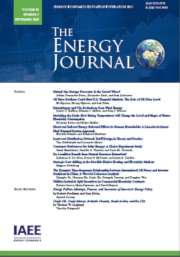
The authors focus on seasonal demand swings in the European natural gas market. They quantify the role of different flexibility options (domestic production, gas storage, and pipeline and LNG imports) that are used to cover European demand fluctuations. This work contributes to the existing literature on seasonal flexibility by addressing the problem with a mathematical gas market optimization model. The paper provides valuable empirical insights into the decline of gas production in northwestern Europe. Furthermore, the authors propose a new metric to quantify the importance of supply sources for seasonal flexibility provision.
You can find the article here: The Energy Journal, Vol. 43, No. 1. 2022. An executive summary is available on this link. The applied GAMS code and associated input data are available in a public GitHub repository.
Why is Germany’s energy transition so expensive?
This is the question Thorsten Engelhorn and Prof. Müsgens answer in their latest paper "Why is Germany’s energy transition so expensive? Quantifying the costs of wind-energy decentralization" published in Resource and Energy Economics.
Some of their conclusions include:
- Variations in (annual average) wind speeds are high even within countries.
- One argument in favor of building a strong transmission grid for electricity: it allows using the best wind sites.
- In the period from 2000 to 2015, the same annual amount of electricity from wind energy in Germany could have been produced at lower costs for turbines (saving up to 30%), lower land use (saving also up to 30%) and significantly less installed turbines (up to 40% less).
You can read the full paper here (Free of charge for the next 50 days)
Prof. Felix Müsgens is one of 21 renowned scientists appointed by 50Hertz to its Scientific Advisory & Project Board (SAPB)
The "Scientific Advisory & Project Board" was established to provide 50Hertz with innovative solutions for a greenhouse gas-neutral future in an interdisciplinary manner and work on them in concrete research and development projects.
The boeard has started to work and discuss the topics of energy scenarios and system security during their workshops. The members of the board hope to dwelve into these topics further in the coming months, provide expertise and recommendations for 50Hertz’s different specialist departments through joint interdisciplinary research and development projects.
Follow this Link to read 50Hertz announcemen and this Link to access SAPB's website.
Prof. Felix Müsgens in a radio interview on the role of battery storage in the energy transition
Prof. Felix Müsgens from BTU Cottbus-Senftenberg was interviewed several times as an expert on the current development of the energy transition in a recent radio programme on RadioEins (RBB). Among other things, the programme focused on the expansion of battery storage systems, their significance for the power grid and the challenges associated with the planned construction of new gas-fired power plants.
Prof. Müsgens explains that the prices for battery storage systems have fallen significantly in recent years - by around half. This has led to a sharp increase in grid connection requests: "Really in the gigawatt range, so more than 200 gigawatts. That's a huge amount. The peak load in Germany is 85 gigawatts."
According to Müsgens, battery storage systems are a "wonderful addition" in the short term, in particular to photovoltaics. They could help to shift solar power to the evening or early morning hours, i.e. when consumption is still high but there is no more sunlight. However, for longer periods without sun and wind - so-called dark doldrums - their benefits are limited: "If we have stored electricity for two hours, this is of little help if we have little renewable feed-in for a fortnight."
Prof. Müsgens was also critical of the planned construction of new gas-fired power plants. In his view, the time frame is problematic: even with rapid planning and realisation, commissioning is not expected before 2032. At the same time, according to international experts, the electricity system must be climate-neutral by 2035. "A gas-fired power plant that goes online in 2032 would therefore either have to be taken off the grid or converted to hydrogen just three years later. This shows how difficult the situation has become."
The RBB report emphasises how topical the energy policy debate is and shows how complex the challenges on the path to climate neutrality are - especially in the electricity sector.
Research by Prof. Müsgens taken up in pv magazine

A recent scientific article by Prof. Dr Felix Müsgens has been picked up by the international trade press. The study, published in the specialist journal Energy Policy, analyses the financial impact of the Renewable Energy Sources Act (EEG) in Germany.
The results show that around 80 to 90 per cent of the subsidies required for existing annexes are already covered by feed-in tariffs and falling technology prices. In addition, the costs for new wind power and photovoltaic systems have fallen considerably in recent years. These developments are helping to make renewable energies increasingly competitive with wholesale electricity.
The renowned pv magazine picks up on the study and emphasises how investments in renewable energies are already having a positive impact today. The publication underlines the relevance of sound economic analyses for the energy transition and shows the contribution that our chair's research can make to the evaluation of energy policy measures.
You can find the article under this link.
Prof. Felix Müsgens interviewed by Tagesschau24 "KlimaZeit: Climate policy in the election campaign" In this interview, the energy expert explains the challenges of the dark doldrums and possible solutions for a stable and affordable electricity supply.
If you activate the integrated Youtube videos, you consent to the transfer of personal data to the provider and to the use of cookies to save the setting. Information of the BTU on data protection
According to Müsgens, a dark doldrums - i.e. a phase with little wind and solar power - leads to extremely high electricity prices that can be up to 20 times higher than average. However, these price peaks are necessary in order to finance investments in power plants, as these are very expensive.
Müsgens names three options for reducing electricity prices:
1.State subsidiesThe price of electricity could be reduced through tax revenue. However, this is an illusion, as the costs would merely be redistributed from the electricity bill to the tax burden.
2. reprioritisation in the energy policy target triangle: An earlier shutdown of coal-fired power plants could be desirable in terms of climate policy, but would drive up costs further.
3. increasing economic efficiency: Müsgens believes this is the best solution. The aim would be to ensure the most efficient power supply possible with the available resources in order to reduce costs.
When asked why reserve power plants are not used in the event of a blackout, Müsgens explains that they are only intended for absolute emergencies such as a blackout. In addition, high electricity prices are necessary to secure investments in power plants. If reserve power plants were to step in too early, operators would no longer be able to cover their costs, which could lead to a shortage of power plants in the long term.
Müsgens emphasises that a clear decision must be made about the future energy system. There is a choice between market-based coordination, in which competition regulates the electricity market, and state regulation, in which the state specifies in detail how the energy supply is organised.
There is currently an unclear mixture of both systems, which is inefficient and makes investment more difficult. Müsgens recommends introducing targeted reforms without fundamentally destabilising the system.
The full interview, from minute 21:09, can be found here: https: //www.ardmediathek.de/video/klimazeit/klimazeit-klimapolitik-im-wahlkampf/tagesschau24/Y3JpZDovL3RhZ2Vzc2NoYXUuZGUvNzExYjQ1NmEtOGE5OC00OWY3LWE5YjMtYzYwY2M4ODZhMjUx
Prof. Müsgens in the Tagesspiegel on the future of the energy transition
A recent article in the Tagesspiegel newspaper addresses the growing challenges of the energy transition in Germany, in particular the problem of so-called dark doldrums - phases in which wind and solar power are almost completely unavailable. The report describes how Germany was once again reliant on expensive electricity imports, including nuclear and coal-fired power, in December. Without a rapid expansion of storage technologies, flexible power plants and improved infrastructure, there is a risk of supply bottlenecks in the long term.
As the Tagesspiegel further reports, Prof. Felix Müsgens, Head of the Energy Innovation Centre at BTU Cottbus, emphasises that the combination of solar and wind power with battery storage is a significant step forward. Nevertheless, there is a lack of climate-friendly, secure power in Germany. Müsgens warns that a successful energy transition can only be achieved through political commitment, economic investment and technological innovation.
The article also makes it clear that new market models are needed to boost investment in storage technologies and hydrogen infrastructure. Müsgens considers the idea of permanently low electricity prices to be unrealistic, as high costs are incurred for grid expansion and new power plants. In the long term, however, research and technological developments could lead to more favourable electricity prices.
In conclusion, the Tagesspiegel emphasises that decisive measures, interdisciplinary cooperation and continuous research are essential to secure the energy transition. The window of opportunity for decisive decisions is closing. You can find the complete article here: https: //www.tagesspiegel.de/wissen/was-jetzt-die-energiewende-gefahrdet-das-zeitfenster-schliesst-sich-13011916.html
Energy expert Felix Müsgens in an interview with the Märkische Allgemeine Zeitung (MAZ): "We will always face the dilemma: affordable or environmentally friendly."
Prof. Felix Müsgens, head of the Chair of Energy Economics at BTU Cottbus-Senftenberg, discussed the challenges of the energy transition in a recent interview. The conversation touched on issues such as the impact of prolonged periods with low renewable energy generation ("Dunkelflauten"), the importance of grid expansion, and the role of new storage technologies in achieving a stable, climate-neutral, and cost-effective energy supply.
"The transition to a green energy system costs us tens of billions of euros annually. However, technologies like solar power and battery storage offer significant opportunities to make the energy transition more efficient and affordable," Müsgens emphasized.
He criticized the premature shutdown of modern coal power plants and delays in expanding power grids, which have contributed to higher costs today. At the same time, he expressed optimism: "Solar power will continue to become cheaper in the future and can cover a significant portion of energy demand. Battery technology has already advanced to the point where industrial applications are feasible."
Research at the Energy Innovation Center (EIZ) focuses on solutions for a climate-neutral energy supply. Scientists at BTU are developing innovative approaches to improve the usability of renewable energy and ensure energy security.
For more insights and the full interview, which is unfortunately behind a paywall, click here.
Prof. Müsgens interviewed by Deutschlandfunk Kultur: "Electricity line at a snail's pace - plans for Südlink presented 10 years ago"
The future of the power lines and the challenges involved in implementing the Südlink project are the focus of an informative radio interview with Professor Felix Müsgens published on Deutschlandfunk Kultur.
The interview sheds light on the background and challenges facing the ambitious Südlink project. Since the plans were presented a decade ago, the implementation has proven to be lengthy and complex. In the interview, Prof. Müsgens offers insights into the developments, hurdles and current positions regarding the planned power line.
The contribution, which is available on the Deutschlandfunk Kultur website (link to the program), offers listeners the opportunity to find out more about the background and possible effects of the Südlink route. Among other things, the technical, economic and social aspects of this important infrastructure project will be discussed.
Media representatives and interested parties can access the full interview on the Deutschlandfunk Kultur website. Prof. Müsgens is available for further information or interview requests.
Scientific Advisory & Project Board meeting with the topic "Green base load for industry needs electricity storage".
As part of a preliminary study commissioned by the transmission system operator 50Hertz, the results on the topic of "Green base load for industry" were presented by the BTU Cottbus-Senftenberg and the Fraunhofer Institute for Energy Infrastructures and Geothermal Energy. This was done during the Scientific Advisory & Project Board meeting on June 21, 2023. The study focused on 24/7 - provision of 1 MW power from renewable energy sources. The key findings of the study are:
- Aggregate RE capacity between 6.3 MW and 7.6 MW is needed to provide 1 MW of green baseload. Short- and long-term storage technologies, as well as sector coupling technologies, play a critical role in limiting the overbuilding of needed renewable generation capacity.
- The cost of 10 cents/kWh is achievable with a renewable share between 90-95% of electricity. However, achieving the last two to five percent of carbon neutrality leads to exponential cost increases driven by storage technologies
Follow this link to the broadcast.
Energy Innovation Center of the Brandenburg Technical University in the broadcast of Brandenburger Begegnungen
Prof. Müsgens talks about the newly founded Energy Innovation Center of the Brandenburg Technical University in the broadcast of Brandenburger Begegnungen - Grüne Energie aus der Lausitz.
Follow this link to listen to the broadcast.
Effects of the war in Ukraine on the German energy system
In an interview with the Chinese television station Phoenix, Prof. Müsgens commented on the effects of the Ukraine war on the German energy system.
Follow this link to hear the full interview.
Challenges of the energy transition: Interview with rbb24
In an interview with rbb24, Prof. Müsgens talks about the goals of the energy transition. The goal of generating 80 percent of Germany's electricity needs from renewable energies is certainly ambitious, but it can be achieved if the right technologies are promoted and the bureaucracy involved in project planning is reduced.
Follow this link to hear the full interview.
International Energy Economics Conference 2023 (IEWT) in Vienna.
During a presentation at the International Energy Economics Conference 2023 (IEWT) in Vienna Prof. Müsgens spoke about the effects of the Ukraine war in the energy market. While the war will have a positive long-term impact on climate protection and the energy transition, in the short term, negative consequences of the conflict are still to be expected. The energy transition will be completed more quickly as a result of the event. On the one hand, natura gas has lost its importance as a bridging technology and on the other, the acceptance of renewable energies and their expansion has risen sharply.
You can access the full article and presentation slides here.
The Chair of Energy Economics is pleased to announce that the BTU Energy Innovation Center project has been given the green light.
On Wednesday, October 12, the 1st phase of the project, which is scheduled to run for a total of ten years, was officially launched. With the participation of 14 BTU chairs and more than 40 other partners, researchers are working to understand the climate-neutral energy supply of the future and to facilitate the energy transition in Lusatia, which is expected to successfully phase out lignite.
Our department is working on topics including "acceptance of wind turbines", "energy system modeling under uncertainty" and "artificial intelligence in energy forecasts".
The project launch was heavily covered by regional and national media. You can find further information in the following links.
| Cottbuser Universität forscht für die Energiewende |
| Süddeutsche.de - October 12, 2022 Wissenschaftler der Universität in Cottbus wollen in einem neuen Innovationszentrum an der klimaneutralen Energieversorgung der Zukunft forschen. |
| Cottbuser Universität forscht für die Energiewende |
| ZEIT online - October 12, 2022 ... ) übernommen. Blick über den Campus an der Brandenburgische Technische Universität Cottbus-Senftenberg. © Patrick Pleul/ dpa-Zentralbild/ … |
| Cottbuser Universität forscht für die Energiewende |
| FAZ.NET - October 12, 2022 Wissenschaftler der Universität in Cottbus wollen in einem neuen Innovationszentrum an der klimaneutralen Energieversorgung der Zukunft forschen. |
| Cottbuser Universität forscht für die Energiewende |
| DIE WELT - October 12, 2022 Blick über den Campus an der Brandenburgische Technische Universität Cottbus-Senftenberg. Quelle: Patrick Pleul/dpa-Zentralbild/dpa/ … |
| Innovationszentrum: Cottbuser Universität forscht für die Energiewende |
| Focus Online - October 12, 2022 ... den Campus an der Brandenburgische Technische Universität Cottbus-Senftenberg. Wissenschaftler de r Universität in Cottbus wollen in einem … |
| Neues BTU-Institut erhält Millionenförderung von Bund und Land |
| rbb Rundfunk Berlin Brandenburg - October 12, 2022 ... : imago-images/Mario Hösel Die Brandenburgische Technische Universität Cottbus-Senftenberg (BTU) hat am Mittwoch eine Millionenförderung … |
| Förderbescheid für das Energie-Innovationszentrum der BTU Cottbus-Senftenberg |
| rbb24 | Brandenburg aktuell | Nachrichten II | 19.30 Uhr - October 12, 2022 Förderbescheid für das Energie-Innovationszentrum der BTUCottbus-Senftenberg |
| Brandenburgische Technische Universität Cottbus-Senftenberg hat weiteren Förderbescheid erhalten |
| rbb24 | 21:45 Uhr | Nachrichten II - October 12, 2022 Brandenburgische Technische Universität Cottbus-Senftenberg hat weiteren Förderbescheid erhalten |
| Cottbuser Universität forscht für die Energiewende |
| Berliner Zeitung - October 12, 2022 ... - Blick über den Campus an der Brandenburgische Technische Universität Cottbus-Senftenberg. a/Archivbild Cottbus - Wissenschaftler de r … |
| Forschung zur Energie der Zukunft |
| Potsdamer Neueste Nachrichten - October 13, 2022 Uni Cottbus bekommt Innovationszentrum |
| Mehr Forschung in der Lausitz |
| Sächsische Zeitung Hoyerswerda - October 13, 2022 Wissenschaftlerinnen und Wissenschaftler der Brandenburgischen Technischen Universität Cottbus-Senftenberg (BTU) und eines interdisziplinären Partnernetzwerks entwickeln innovative Technologien für eine klimaneutrale Energieversorgung. Wissenschaftlerinnen und Wissenschaftler der Brandenburgischen Technischen Universität Cottbus-Senftenberg (BTU) und eines |
| Förderung für neues Energie- Innovationszentrum in Cottbus |
| MAZ-Online.de - October 12, 2022 Wissenschaftsministerin Schüle fördert Cottbuser Energiezentrum MIt 18,5 Millionen Euro Startkapital wird in Cottbus der Grundstein für Forschung und Entwicklung zur Energiewende gelegt. |
| Innovationszentrum an Uni in Cottbus gestartet |
| Sächsisches tageblatt - October 13, 2022 Wissenschaftler der BTUCottbus/Senftenberg wollen an der klimaneutralen Energieversorgung der Zukunft forschen. Gestern ist ein neues … |
| Innovationszentrum: Cottbuser Universität forscht für die Energiewende |
| Augsburger Allgemeine - October 12, 2022 Blick über den Campus an der Brandenburgische Technische Universität Cottbus-Senftenberg. Foto: Patrick Pleul/dpa-Zentralbild, dpa ( … |
| Cottbuser Universität forscht für die Energiewende |
| Münchner Merkur - October 12, 2022 Blick über den Campus an der Brandenburgische Technische Universität Cottbus-Senftenberg. © Patrick Pleul/dpa-Zentralbild/dpa/ … |
| Jobs in Brandenburg: Start für Energie-Innovationszentrum an der BTU in Cottbus - Fachkräfte gesucht |
| Lausitzer Rundschau - October 12, 2022 ... neue Arbeitsplätze hatte die Präsidentin der Brandenburgischen Technischen Universität (BTU) Cottbus-Senftenberg , Prof. Gesine Grande, … |
| Start für Energie-Innovationszentrum an BTU |
| Lausitzer Rundschau Cottbus, sieben weitere Ausgaben und Online - October 13, 2022 Der Lausitz Science Park (LSP) in Cottbus wird zum Jobmotor. Mit dem Start für das Energie-Innovationszentrum (EIZ) an der BTU geht das größte Wissenschafts-Projekt im Lausitzer Strukturwandel in eine neue Phase. Gebraucht werden viele Fachkräfte. |
| Cottbuser Universität forscht für die Energiewende |
| Volksstimme.de - October 12, 2022 Wissenschaftler der Universität in Cottbus wollen in einem neuen Innovationszentrum an der klimaneutralen Energieversorgung der Zukunft forschen. |
| 102 Millionen Euro für die zukünftige Energiemodellregion Lausitz |
| Informations Dienst Wissenschaft - October 13, 2022 ... -Cluster Wissenschaftler*innen der Brandenburgischen Technischen Universität Cottbus-Senftenberg (BTU) und eines interdisziplinären … |
| RT @ManjaSchuele: Lausitz = #Energieregion der Zukunft! Bald kommen aus dem neuen #EnergieInnovationszentrum der @BTU_CS wegweisende |
| RT @ManjaSchuele: Lausitz = #Energieregion der Zukunft! Bald kommen aus dem neuen #EnergieInnovationszentrum der @BTU_CS wegweisende |
| 102 Millionen Euro für die zukünftige Energiemodellregion LausitzWissenschaftsministerin Dr. Manja Schüle und Sandra Langhof-Siewert von |
| Ministerin @ManjaSchuele & Sandra Langhof-Siewert (@staatskanzleibb) übergeben den Zuwendungsbescheid ans neue Energie-Innovationszentrum |
Germany saves gas
In an interview with mdr Wissen, Prof. Müsgens talks about how the lack of direct price signals for gas consumers makes it more difficult to implement saving measures. In particular, he criticizes efforts to cap prices, as this would remove the signals to reduce consumption.
You can read the full article here.
Gas price cap - can we square the circle?
In interview with Radioeins, prof. Müsgens discusses the decision of the German gas commission on a relieve package for Gas consumers to tackle the high fuel prices.
The policy's double objective of relieving gas consumers of the monetary burden while still preserving the incentives to save gas is described as trying to square a circle.
Follow this link to listen to the full interview.
Gas shortage: Bavaria faces problems with electricity, the East with heat
In an interview with MDR Prof. Müsgens comments on the effects of the gas shortage on the electricity and heat availability in Bavaria and east Germany.
While the gas situation is still stable, additional system stress could materialize in winter exposing Germany to an energy crisis.
You can read the full article here.
Price shock due to Ukraine war
In an interview with FOCUS online, Prof. Müsgens talks about the impact of high wholesale energy prices on household tariffs. In the next two years German households should experience even higher prices.
You can read the full article here or on FOCUS online.
Panel discussion at the Brandenburg's Energy Day
Within the framework of the Brandenburg Energy Day at the BTU cottbus, ZEIT ONLINE reported on the uncertain future of the Schwedt oil refinery in the face of a halt of Russian oil imports. In the same line, Prof. Müsgens commented that the situation with Russia will further increase energy prices for end-consumers and a short-term moratorium on the phase-out of coal-fired plants should be considered.
You can read the full article here or on the ZEIT website.
Before it gets cheaper, it gets even more expensive
In an interview with "Die Zeit", Prof. Müsgens talks about the impact of high wholesale energy prices on household tariffs. According to the high forecasts for next year, German households can only expect higher prices.
You can access the full article here or in the Zeit webpage.
Expensive energy - energy price crisis?
In an interview with rbb, Prof. Müsgens comments on the skyrocketing electricity prices. High gas and oil prices as a result of the sanctions against Russia and market speculation are the underlying reasons.
Watch the full video on our YouTube channel and on the rbb website.
Why an oil embargo would hit eastern Germany particularly hard
In an interview for MDR Prof. Müsgens comments on the implications of an embargo on Russian oil on the German market.
The article can be found here or in the MDR portal
Can Germany stop buying Russian coal?
In an interview with the Zeit newspaper, Prof. Müsgens discusses the implications of the economic sanctions imposed to Russia on the coal prices and its effects for Germany.
You can access the full article here or in the Zeit webpage.
Prof. Müsgens discusses the implications of the German dependency on Russian fuels in an interview for Märkische Allgemeine (MAZ)
In an interview for Märkische Allgemeine (MAZ) Prof. Müsgens discusses the dependency of Germany and Europe on Russian gas and oil, the future of lignite and the possibilities of saving energy.
In his opinion, regarding the expansion of sanctions against Russia, the West should focus on the issue of oil, since Russian revenues from oil exports are three times as high as those from gas exports. Also, Germany would more easily cope with a supply stop of Russian oil than a stop on gas supply.
A long version of the interview is available here, a short version here.
Prof. Müsgens comments on the implications of the Ukrainian war in the German energy system
In an interview with rbb, Prof. Müsgens discusses the implications of the Ukrainian war for the German electricity system. Due to the high dependancy of Germany on Russian gas imports problems from increased prices to system security. Greater presures will be met in the short-term, and Germany needs to adress solutions and alternatives to face next winter.
See the full video on our YouTube channel and also on the rbb website.
Earlier coal phase-out?
In an interview for the Deutsche Presse-Agentur (Die Zeit newspaper), Prof. Felix Muesgens explains how an earlier coal phase-out is possible. He talks about the market conditions and political requirements necessary for this.
You can find the article here
Earlier coal phase-out possible under conditions
In an interview with ntv, Prof. Felix Müsgens comments on Germany's coal phase-out policy and its feasibility, taking into account market flexibility options and plans to expand renewables.
You can read the full article here
Thousands of households without electricity
rbb reports on the power blackout that left tens of thousands of households in Oberspreewald Lausitz and Spree-Neiße without electricity for more than 24 hours. In the video, Prof. Müsgens comments on questions of the security of the electricity system and the trade-off between system costs and reliability.
You can watch the video on our YouTube channel and also on the rbb website.
Prof. Müsgens gives his opinion on the extreme rise of gas prices to rbb
The rbb reports on the newly converted gas fired power plant in Cottbus and the effects of high gas prices on electricity prices. In the video, Prof. Müsgens explains why gas prices have gone so high up and the expectetions in the short and long term.
You can watch the video on our YouTube channel and also on the rbb website.
Is the coal phase-out coming sooner than expected?
The news outlet RBB reports on LEAG's decision to adjust its plans for the coal phase-out in Cottbus. The company plans to produce even less coal than expected, which could lead to an earlier exit. Prof. Müsgens comments on this decision and talks about the difficulties for coal-fired power plants to remain profitable at current and projected energy prices.
You can access the news hier.
Interview on the energy transition in Germany and its effects in Lusatia.
You can find the link to the interview here. The interview appeared in the Lausitzmagazin and was conducted by Mr. Taschenberger.
Media reports on the ESYS Market Design Working Group (co-chaired by Prof. Müsgens)
- solarify: ESYS: New market design for the energy transition
- energate messenger: Researchers' alliance proposes new electricity market design ( fee required,)
- E&M daily: New market design for the energy transition is demanded
*Articles are only available in German
Media coverage of the article "Offshore wind competitiveness in mature markets without subsidy".
(Selected) media coverage of the published article:
- Invited guest post at CarbonBrief
- Frankfurter Allgemeine Zeitung
- The Telegraph
- The York Press
- Science Daily
- The Guardian
- Imperial College London
The full article can be found here: Offshore wind competitiveness in mature markets without subsidy, Nature Energy, 2020. An open access version is available at the following link: https://rdcu.be/b5R42 (read-only access).
Comments on the CO2 price reform and the Climate Cabinet
- pv-magazine.de: "Ein einheitlicher CO2-Preis: der Schlüssel für ein effizientes Marktdesign"
- solarserver.de: "Fachleute fordern einheitlichen CO2-Preis"
- solarify.eu: "Einheitlicher CO2-Preis als Schlüssel für effizientes Marktdesign"
- bizz-energy.com: "Union ringt um Klimaschutz-Pläne"
- Tagesspiegel Background: "Leitlinien für CO2-Preisanpassung gefordert"
- Energie & Management: "Wissenschaftler: CO2-Bepreisung schafft doppelte Dividende"
Comment by Prof. Müsgens in the magazine e/m/w: We need a new market design
A comment by Prof. Müsgens titled "The time is ripe for a new market design" has been published in the magazine e/m/w. You can find the article under the following Link.
Report on the power-to-heat project of the research department
The link to the report of the Lausitzer Rundschau with the title "Sensibly dealing with too much electricity" can be found here.
Structural change in Lusatia
The Berliner Zeitung interview " Many ideas, no guarantees" can be found here.
BDEW controversies - discussion on market design with Prof. Höffler
You can find the link to the article here.
Television report on climate protection on rbb aktuell
You can find the link to the report here.
Interview with Südwestpresse on electricity price development
You can find the link to the interview here.
LinkedIn page
Here you can find the LinkedIn page of the Chair of Energy Economics.
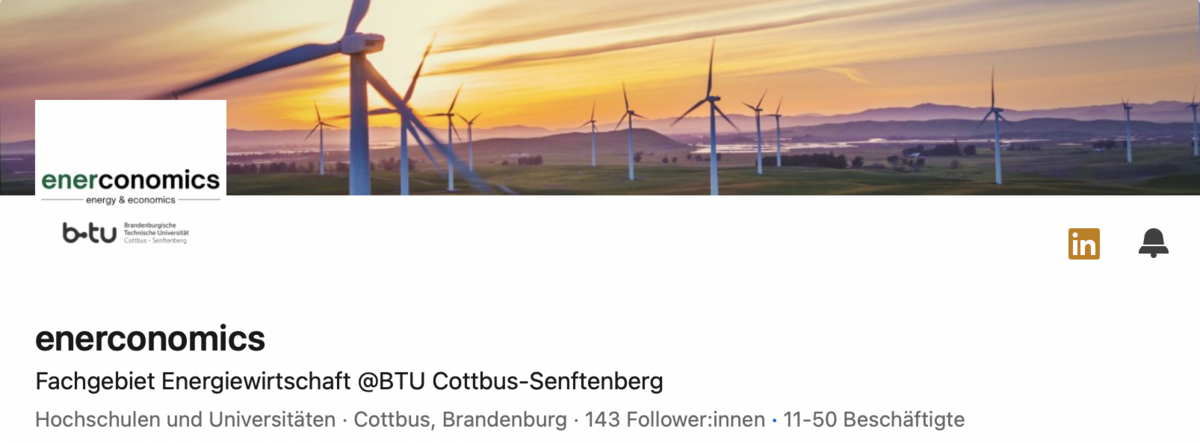
YouTube channel
Here you can find the Youtube-Channel of the Chair of Energy Economics.
